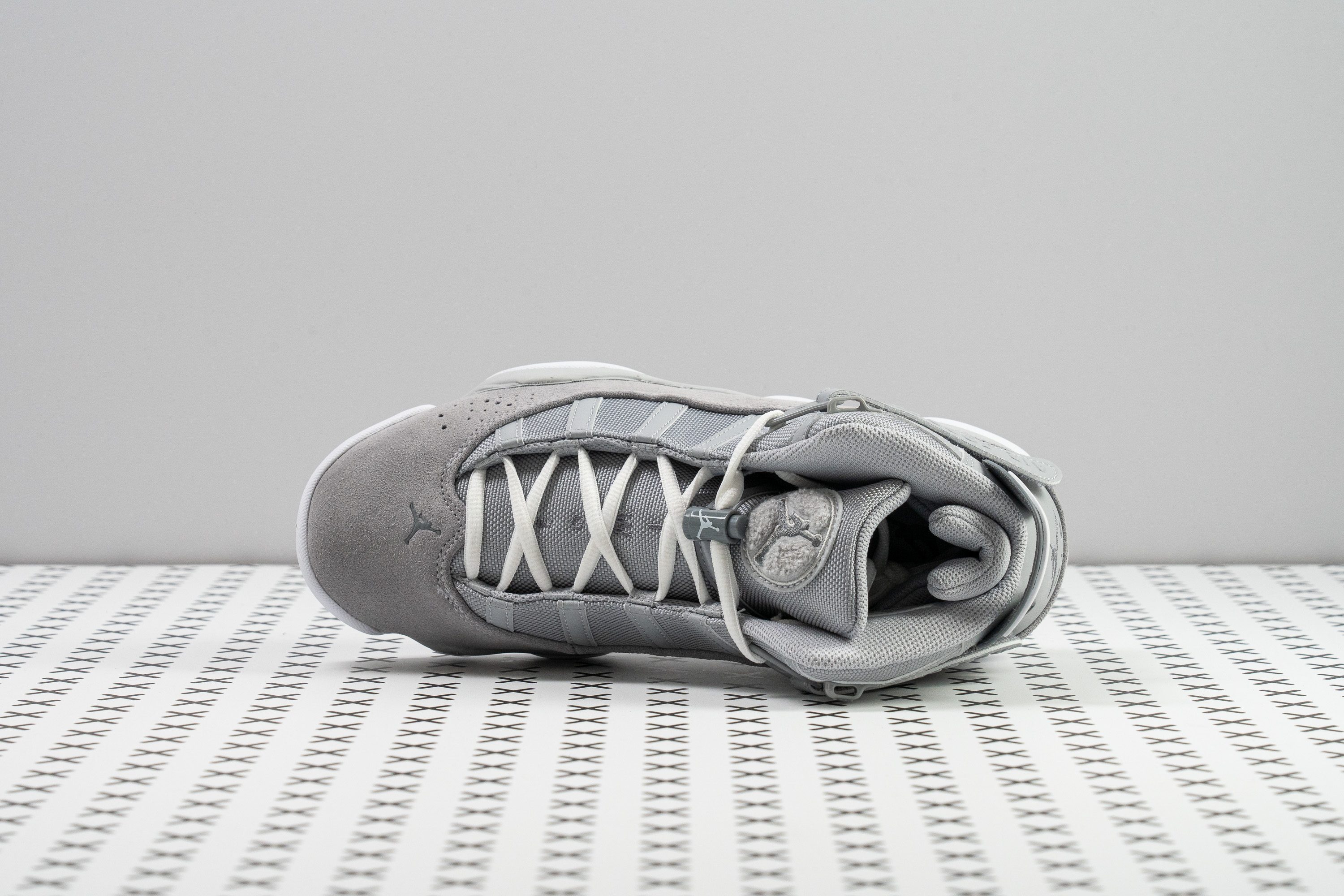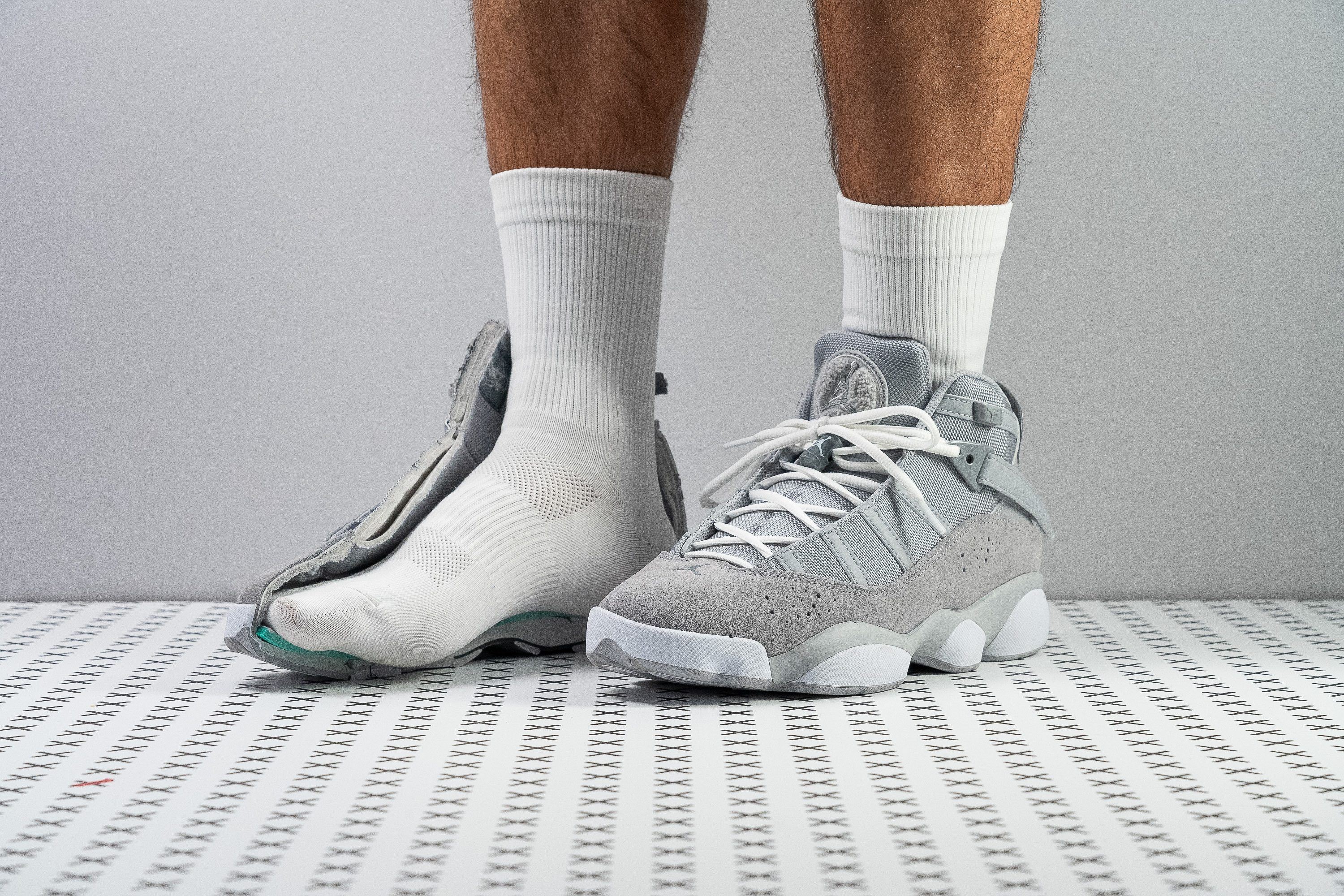Our verdict
Pros
- Exceptionally springy Zoom Air ride
- Very stable and supportive build
- Highly secure foot containment
- Fantastic wear resistance and durability
- Features real suede/leather on the rand
- Easier on-and-off with a large heel loop
- Full of Easter eggs from seven Jordan shoes
- Stand out from the crowd
- Excellent outsole grip
Cons
- Lacks comfort for all-day wear
- Very stiff, needs breaking in
- Not breathable
Audience verdict
- Top 30% in trainers
- Top 30% in laced trainers
- Top 23% most popular trainers
Comparison
The most similar trainers compared
+ + Add a shoe | |||||
|---|---|---|---|---|---|
| Audience score | 92 Great! | 93 Great! | 93 Great! | 86 Decent! | |
| Price | £180 | £160 | £130 | £105 | |
| Style | RetroSporty | RetroSporty | ClassicRetroSporty | RetroSporty | |
| Shock absorption | Moderate | - | - | - | |
| Energy return | High | - | - | - | |
| Traction | High | - | - | - | |
| Breathability | Warm | Moderate | Warm | Moderate | |
| Weight lab | 16.3 oz / 462g | 15.8 oz / 449g | 15.1 oz / 427g | 17.4 oz / 493g | |
| Size | True to size | True to size | True to size | Slightly small | |
| Midsole softness | Firm | Firm | Soft | Soft | |
| Material | LeatherSuedeTextile | LeatherMesh | Cup SoleLeather | SuedeVulc Sole | |
| Season | SpringFall | SpringFall | Winter | SpringFall | |
| Inspired from | Basketball | Basketball | Basketball | Skate | |
| Width / fit | Medium | Medium | Medium | Wide | |
| Toebox width | Medium | Medium | Medium | Medium | |
| Leather/suede quality | Real suede | - | Real leather | Real suede | |
| Toebox durability | Good | Decent | Decent | Good | |
| Heel padding durability | Decent | Decent | Decent | Decent | |
| Outsole durability | Good | Decent | Good | Decent | |
| Heel stack lab | 25.5 mm | 27.1 mm | 22.2 mm | 21.8 mm | |
| Stiffness | Stiff | Stiff | Stiff | Stiff | |
| Tongue padding | Average | Average | Average | Average | |
| Drop lab | 8.5 mm | 7.1 mm | 11.0 mm | 8.1 mm | |
| Forefoot | 17.0 mm | 20.0 mm | 11.2 mm | 13.7 mm | |
| Removable insole | ✓ | ✓ | ✓ | ✓ | |
| Heel tab | Finger loop | Finger loop | None | None | |
| Torsional rigidity | Stiff | Stiff | Moderate | Flexible | |
| Heel counter stiffness | Moderate | Moderate | Stiff | Moderate | |
| Closure | LacesVelcro | Laces | Laces | Laces | |
| Top | Mid top | High top | Mid top | Mid top | |
| Ranking | #36 Top 30% | #22 Top 19% | #29 Top 24% | #110 Bottom 9% | |
| Popularity | #27 Top 23% | #75 Bottom 38% | #52 Top 43% | #51 Top 43% |
Who should buy
We believe that you will appreciate the Jordan 6 Rings if you are in the market for the following:
- a symbolic Jordan edition that pays homage to the height of Michael Jordan's career by fusing the elements from seven trainers that he wore during his six championships
- a hybrid lifestyle basketball shoe that can transition from the court to the streets (but not a dedicated hoop shoe)
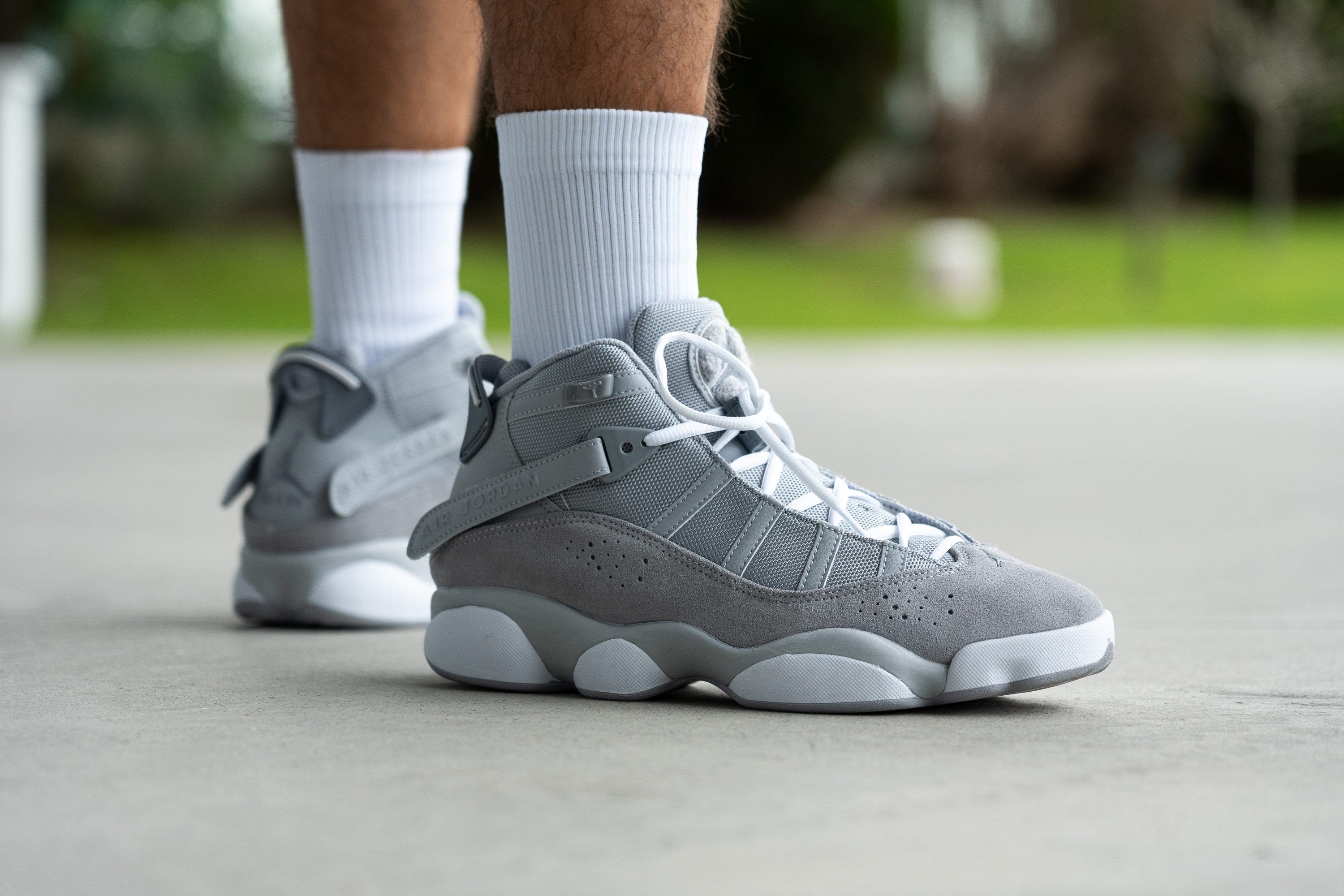
Who should NOT buy
Supposed to rock both streets and courts, the Jordan 6 Rings doesn't excel at either. A fashion statement? Sure. A sneaker collection item? Yes! A comfortable sneaker for hours on your feet? NOPE.
At the same price point, you can get one or even two well-cushioned trainers from Nike or New Balance that will keep you comfortable from dusk to dawn.
If, on the other hand, you want a basketball-ready shoe, go for the hottest Air Jordan XXXVIII instead.
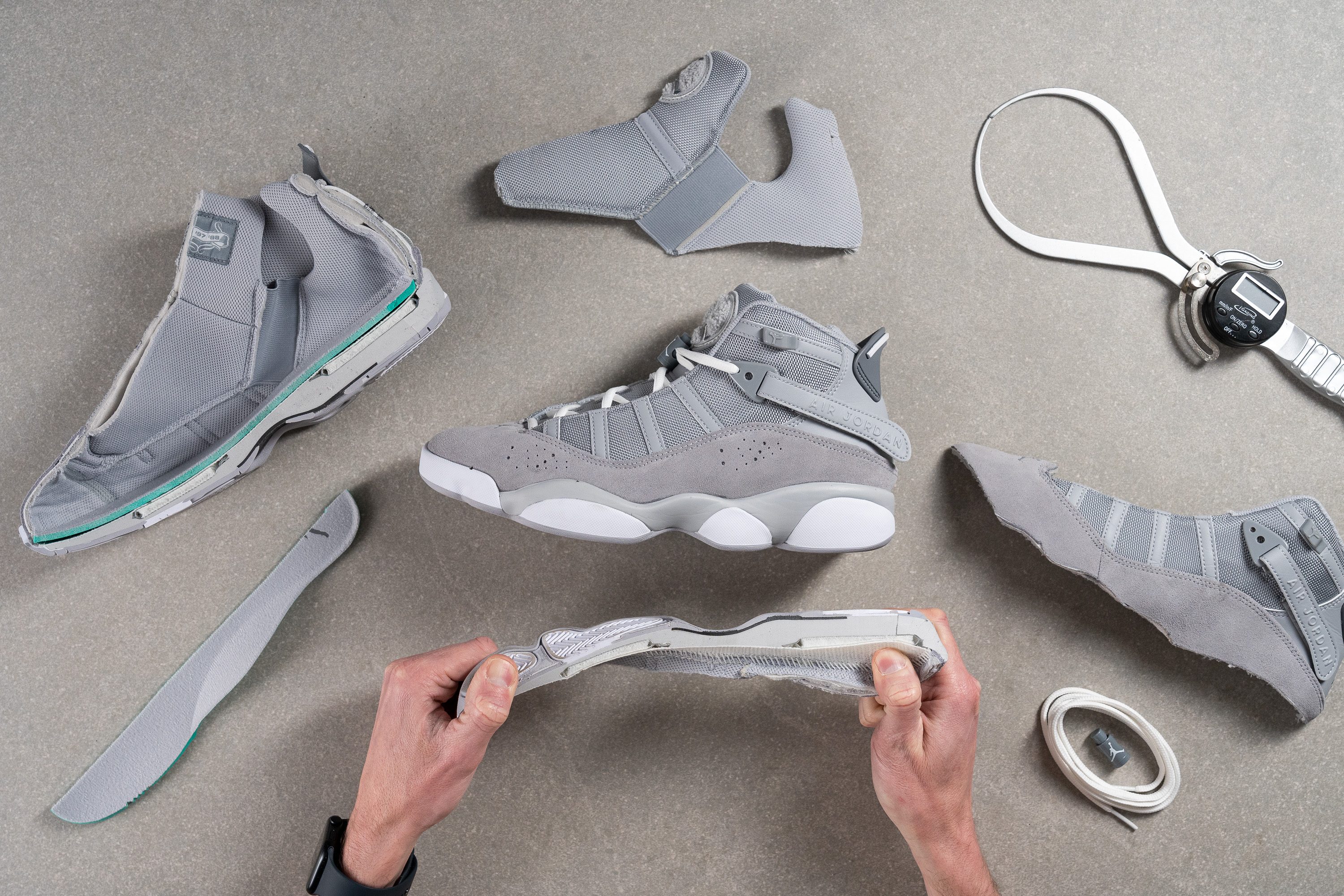
Cushioning
Shock absorption
Despite its chunky silhouette, there is not a tonne of cushioning in this Jordan sneaker. There is not much underfoot material to provide that impact protection.
Testing the shoe's ability to attenuate impact forces, we recorded a below-average reading of 83 SA. It is only moderately comfortable for spending long hours on your feet, but it is a bonus for folks who value stability and groundedness underfoot.
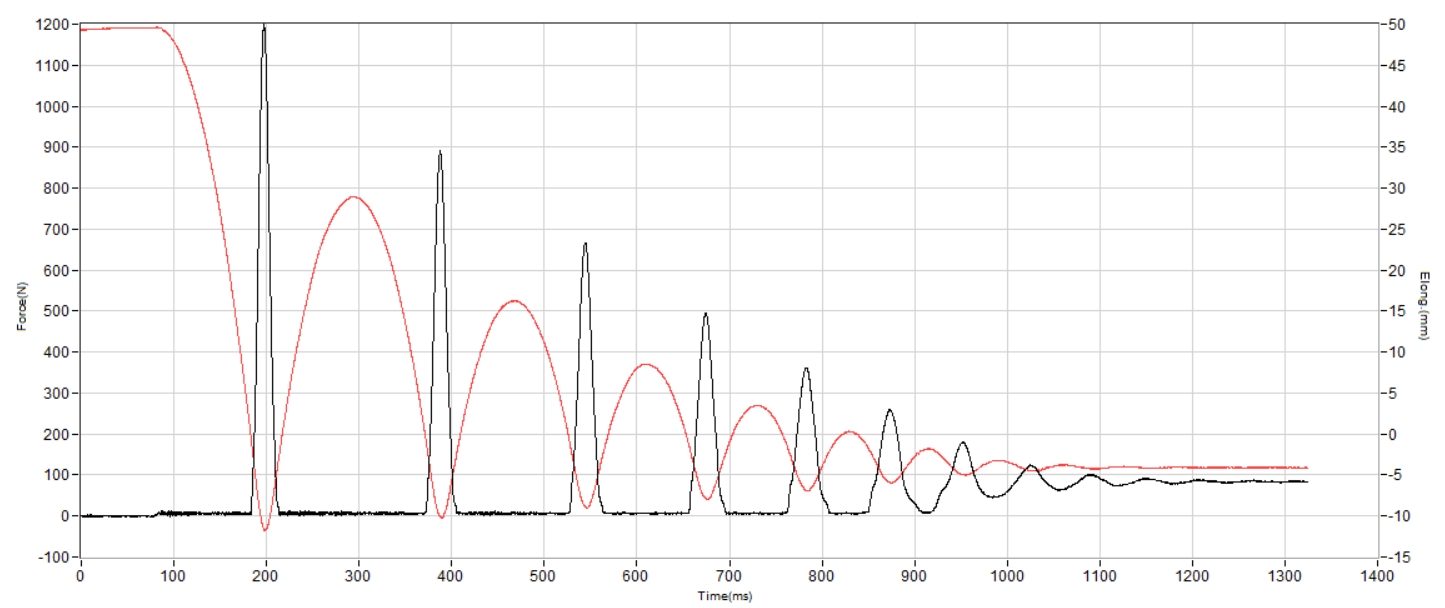
| 6 Rings | 83 SA |
| Average | 89 SA |
Energy return
But on a positive note, the 6 Rings offers some of the liveliest and responsive experiences, thanks to the two large Zoom Air units in its midsole.
This pressurised air technology elevated the shoe's energy return to a whopping 64%, offering the springiness level of high-performance running shoes!
| 6 Rings | 64.0% |
| Average | 50.2% |
Heel stack
The kick's chunky-looking sole may trick you into thinking that the Jordan 6 Rings has plenty of cushioning.
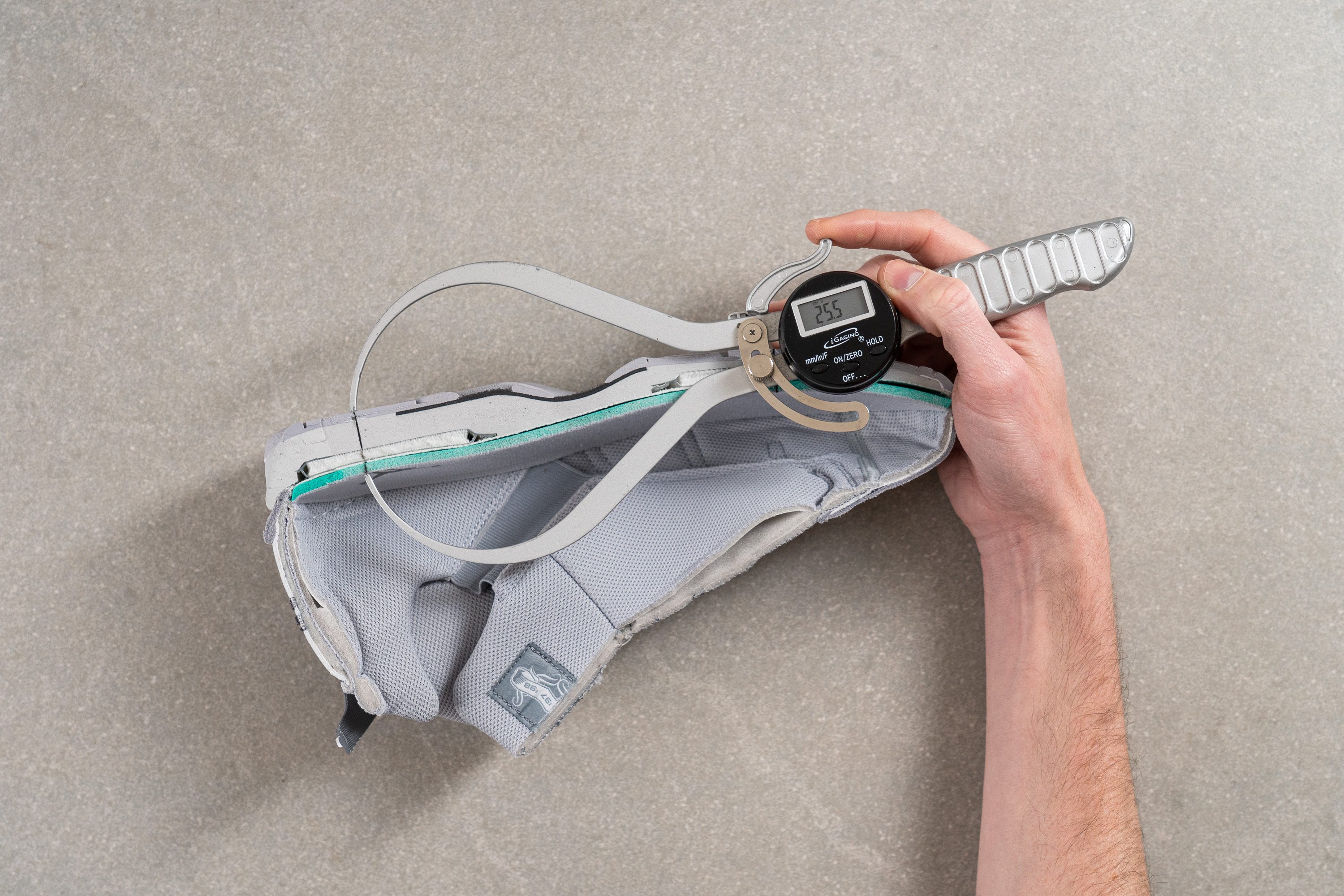
Having cut the shoe in half, we measured its heel stack height at only 25.5 mm! This is lower than the average sneaker and is almost as low as the Converse Chuck 70 (24.3 mm)!
Good thing Jordan packed responsive Zoom Air units into the shoe's midsole to ensure impact protection.
| 6 Rings | 25.5 mm |
| Average | 30.7 mm |
Forefoot stack
The 6 Rings also places the foot quite low to the ground in the forefoot.
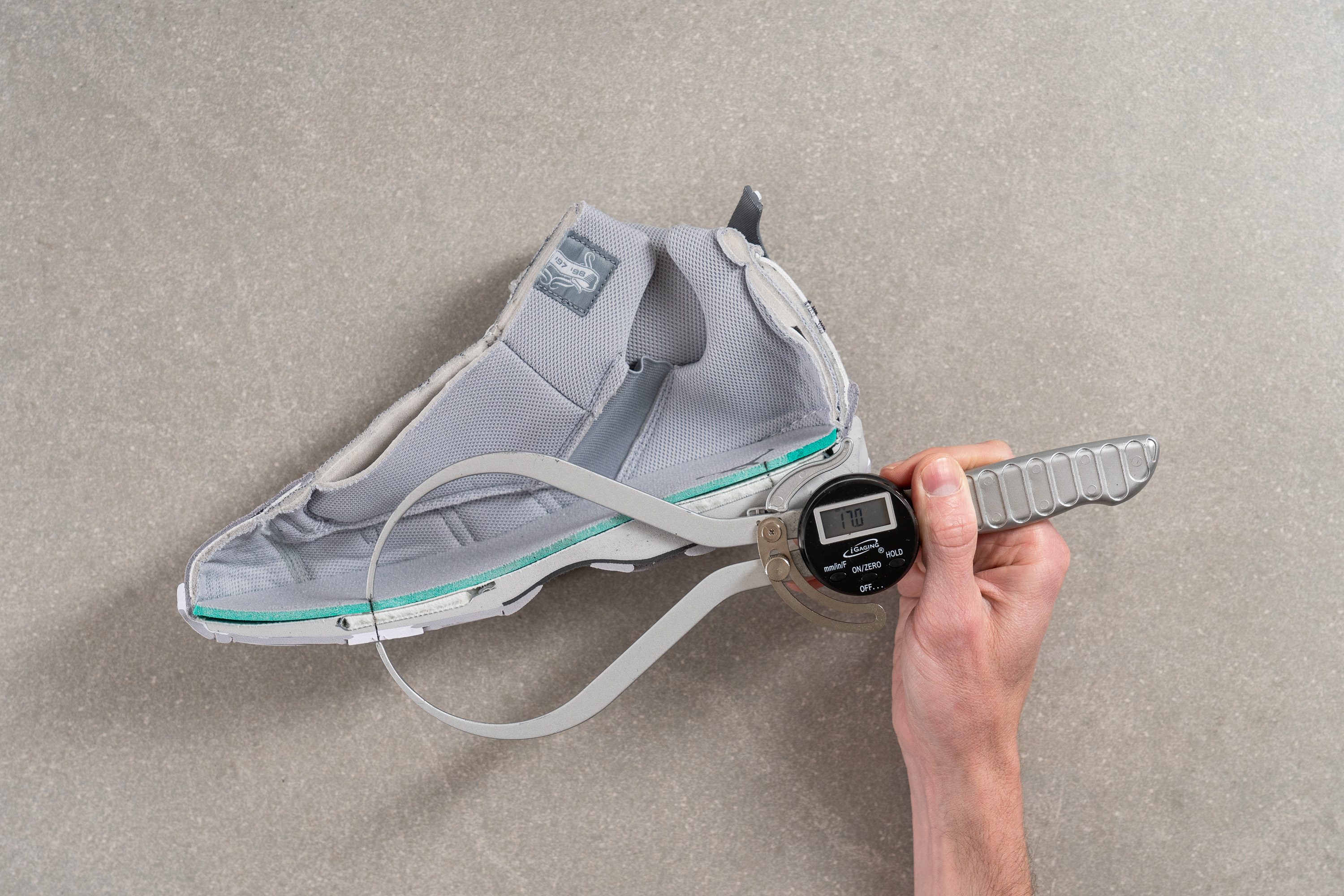
With a stack height of 17.0 mm, it is a couple of millimetres lower than average. But the Zoom Air unit prevents the ground feel from being too sensitive.
| 6 Rings | 17.0 mm |
| Average | 19.5 mm |
Drop
The Jordan 6 Rings has a gradual heel-to-toe drop of 8.5 mm. It elevates the heel slightly above the toes for a touch of support in the rearfoot.
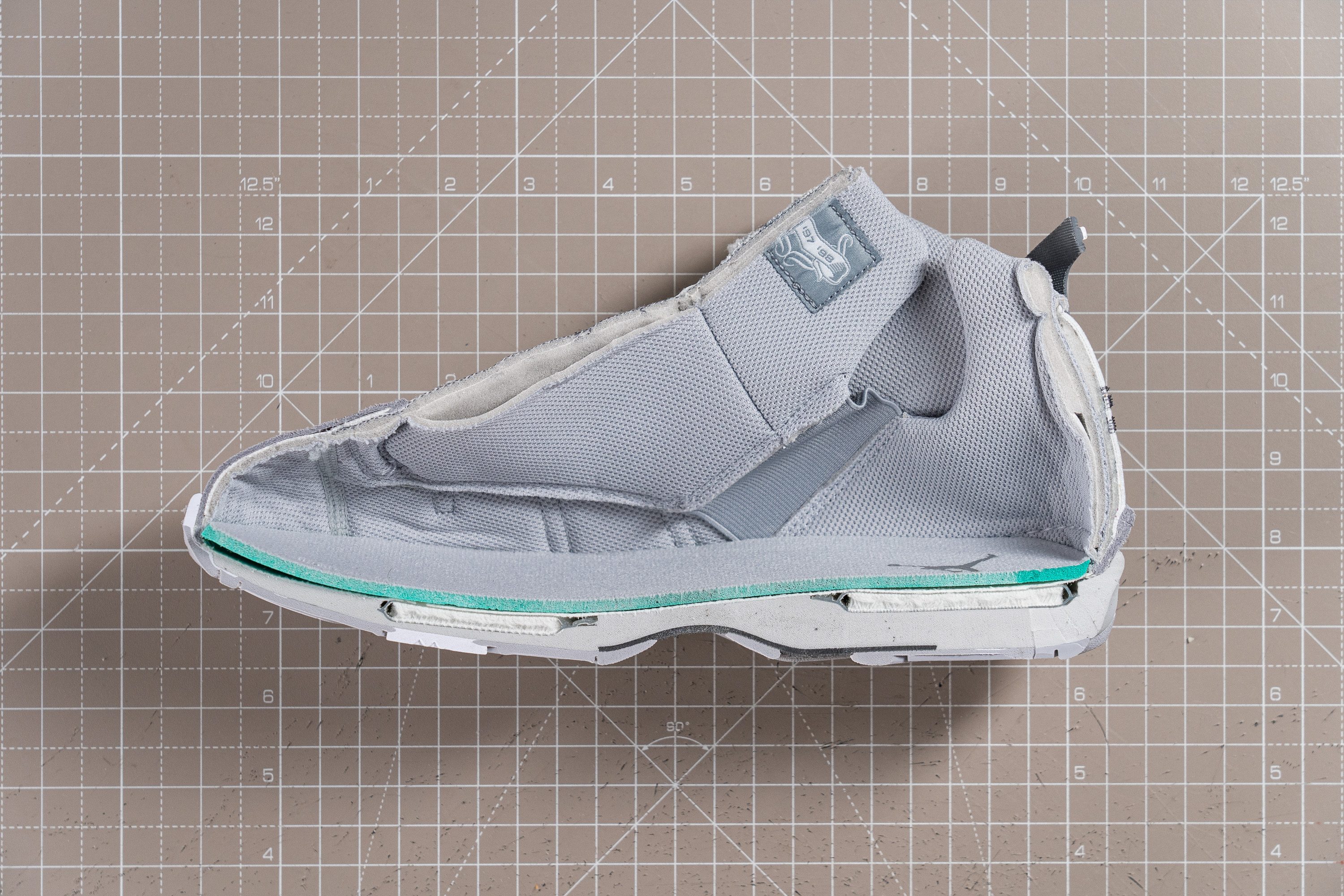
| 6 Rings | 8.5 mm |
| Average | 11.2 mm |
Midsole softness
If you are considering the Jordan 6 Rings for regular daily wear, keep in mind that its cushioning is on the firm side.
We could feel its firmness on the foot and confirmed it in our durometer measurement. With a reading of 32.0 HA, the shoe's midsole is firmer than 60% of our lab-tested trainers.
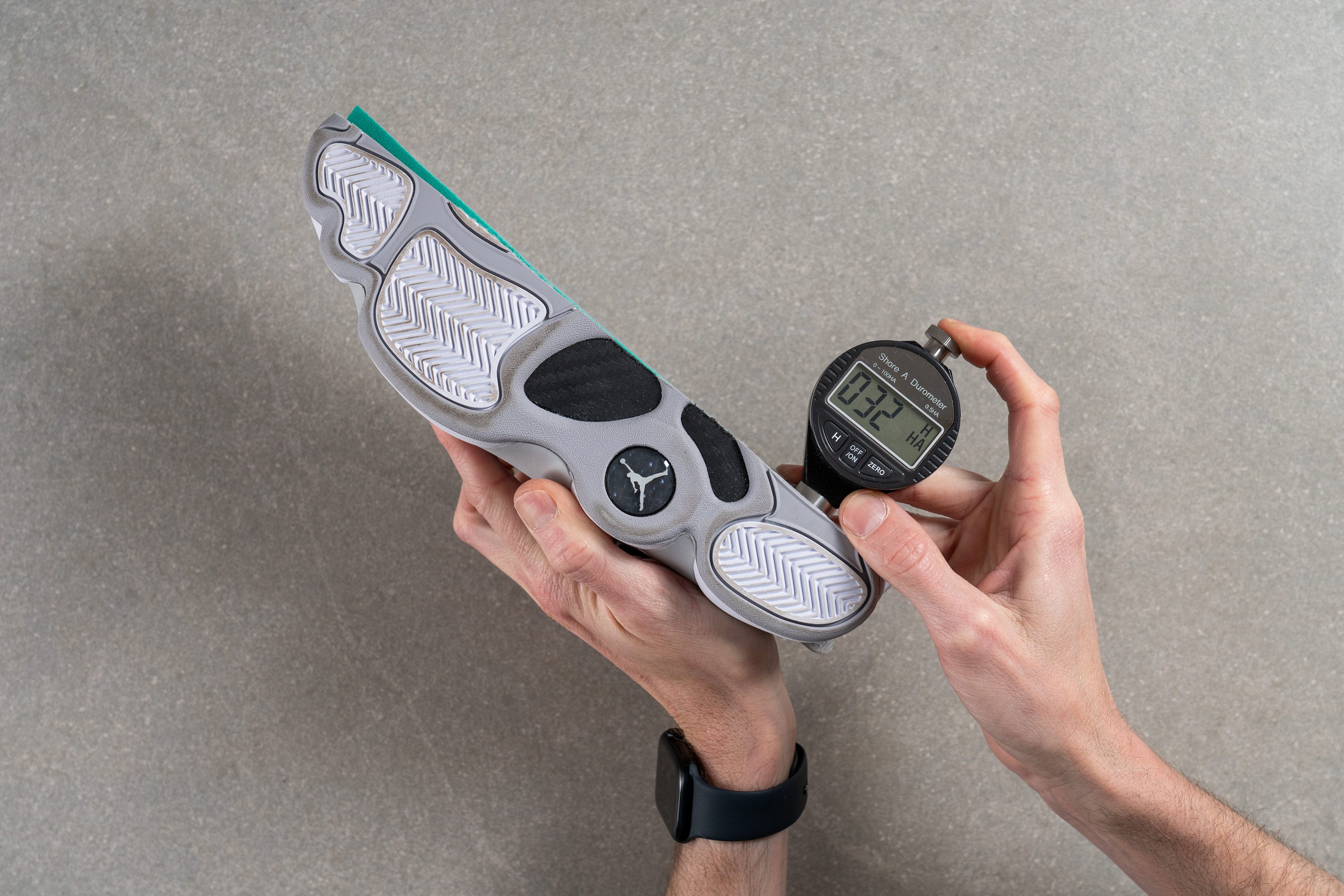
Zoom Air units don't make the 6 Rings any plusher but prevent it from feeling too blunt underfoot. They just add a bit of pep to the step.
| 6 Rings | 32.0 HA |
| Average | 28.6 HA |
Size and fit
Size
Jordan 6 Rings fits true to size (668 votes).
Internal length
On its official website, Jordan recommends going a half size up for the 6 Rings because the shoe runs a bit small.
But in our own experience, the shoe was perfectly fitting in our regular US size 9.
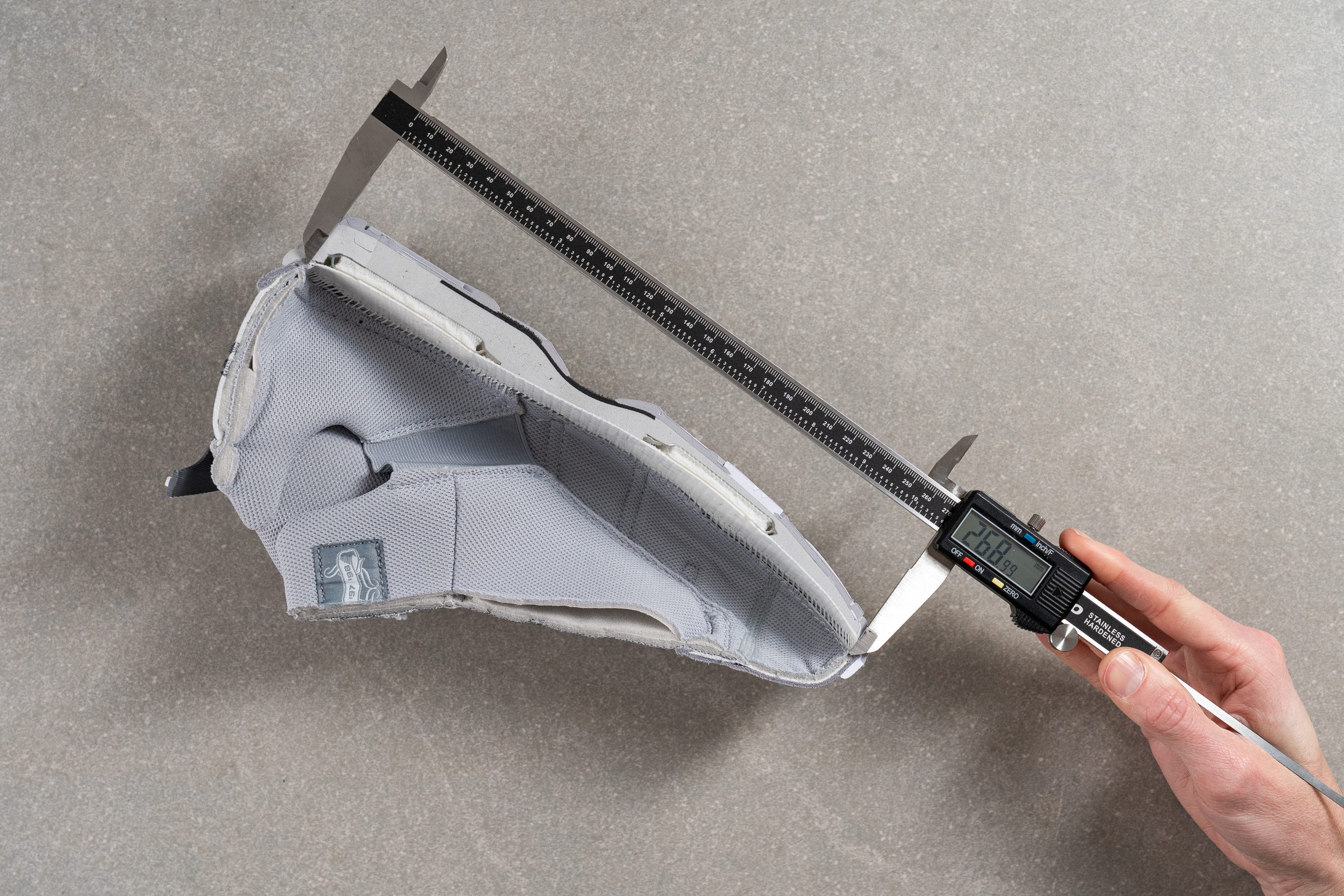
We also measured the shoe's internal length at 269.0 mm which corresponds to the US size 9 in the brand's size chart.
If you find yourself in between sizes or in doubt, it is safe to try a half-size larger. The shoe's upper is pretty stiff and has zero stretch. The added lip around the heel also takes a couple of millimetres away from the in-shoe space.
| 6 Rings | 269.0 mm |
| Average | 272.3 mm |
Width / Fit
The 6 Rings fits as expected. Our medium-width feet felt happy in the shoe throughout the wear test.
And when we measured the gel mould's widest part with a calliper, a reading of 92.2 mm confirmed that this Jordan sneaker falls into the dimensions of a D-medium-width shoe.
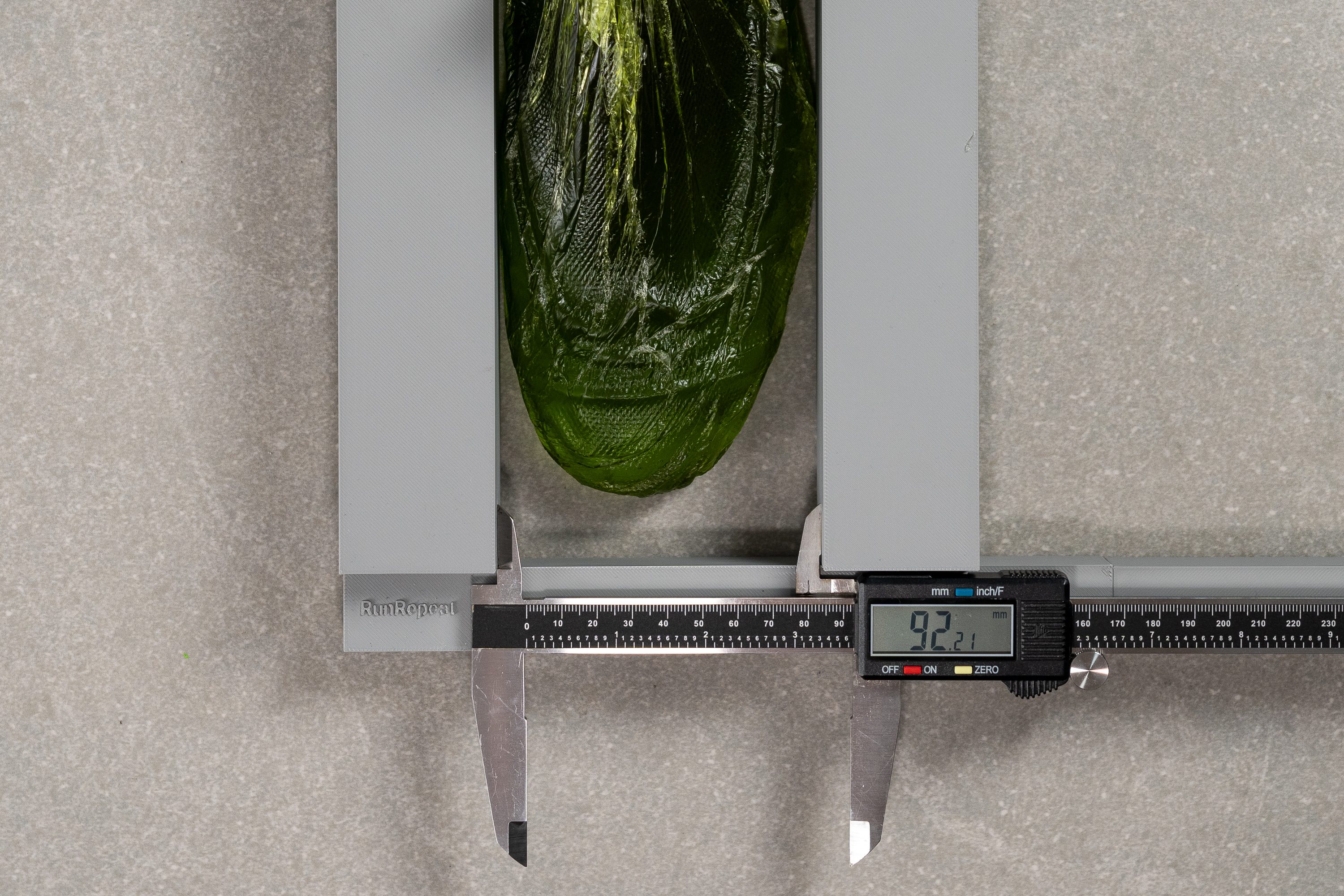
| 6 Rings | 92.2 mm |
| Average | 92.5 mm |
Toebox width
The shoe's toebox doesn't get critically narrow toward the front either. It has a fairly rounded shape that never squeezed our toes.
Checking its width near the big toe, our calliper returned a standard reading of 67.1 mm.
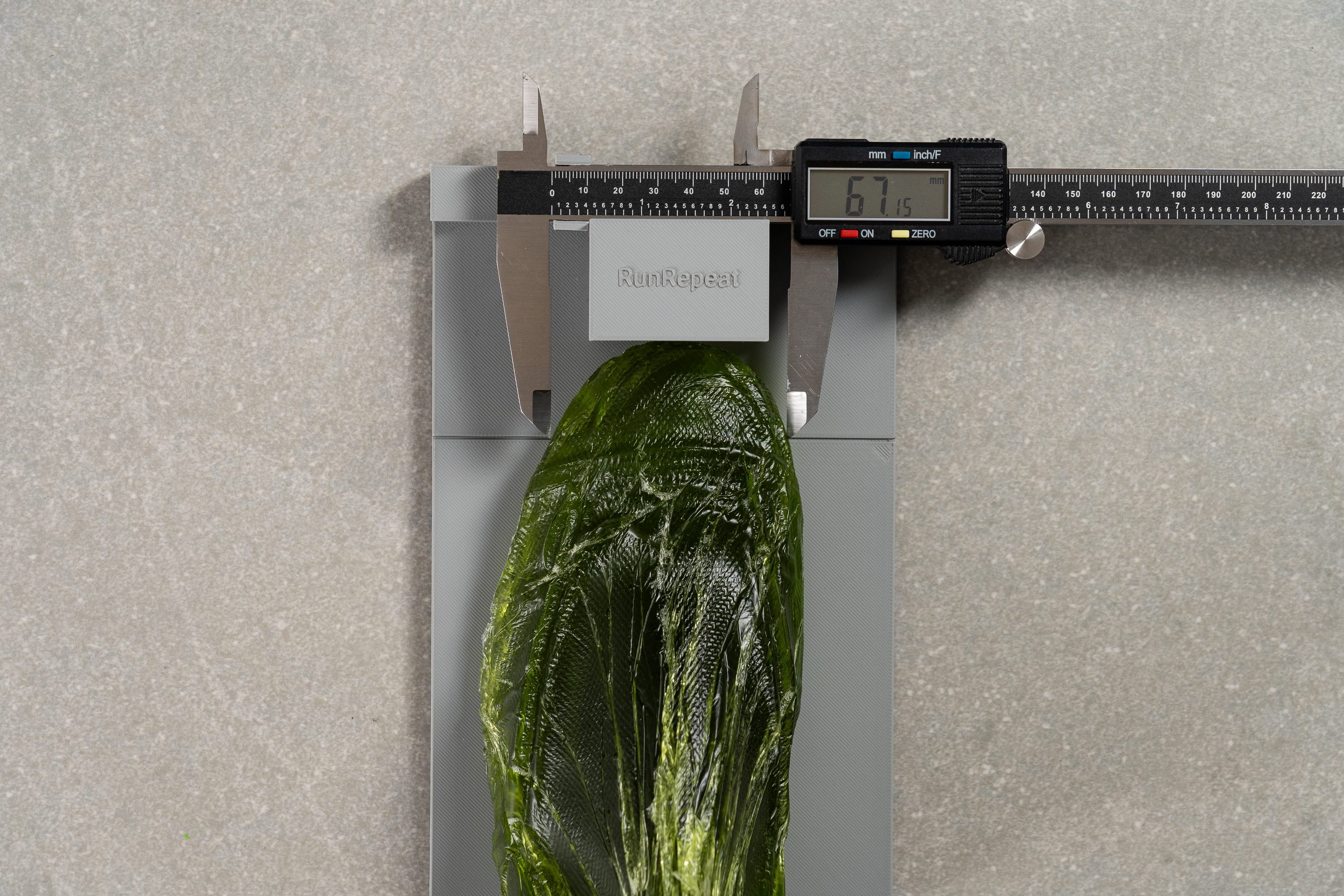
| 6 Rings | 67.1 mm |
| Average | 68.9 mm |
Toebox height
We also found that the suede material on top of the shoe's toebox doesn't put any pressure on the toes. Our calliper showed a solid vertical space of 28.5 mm.
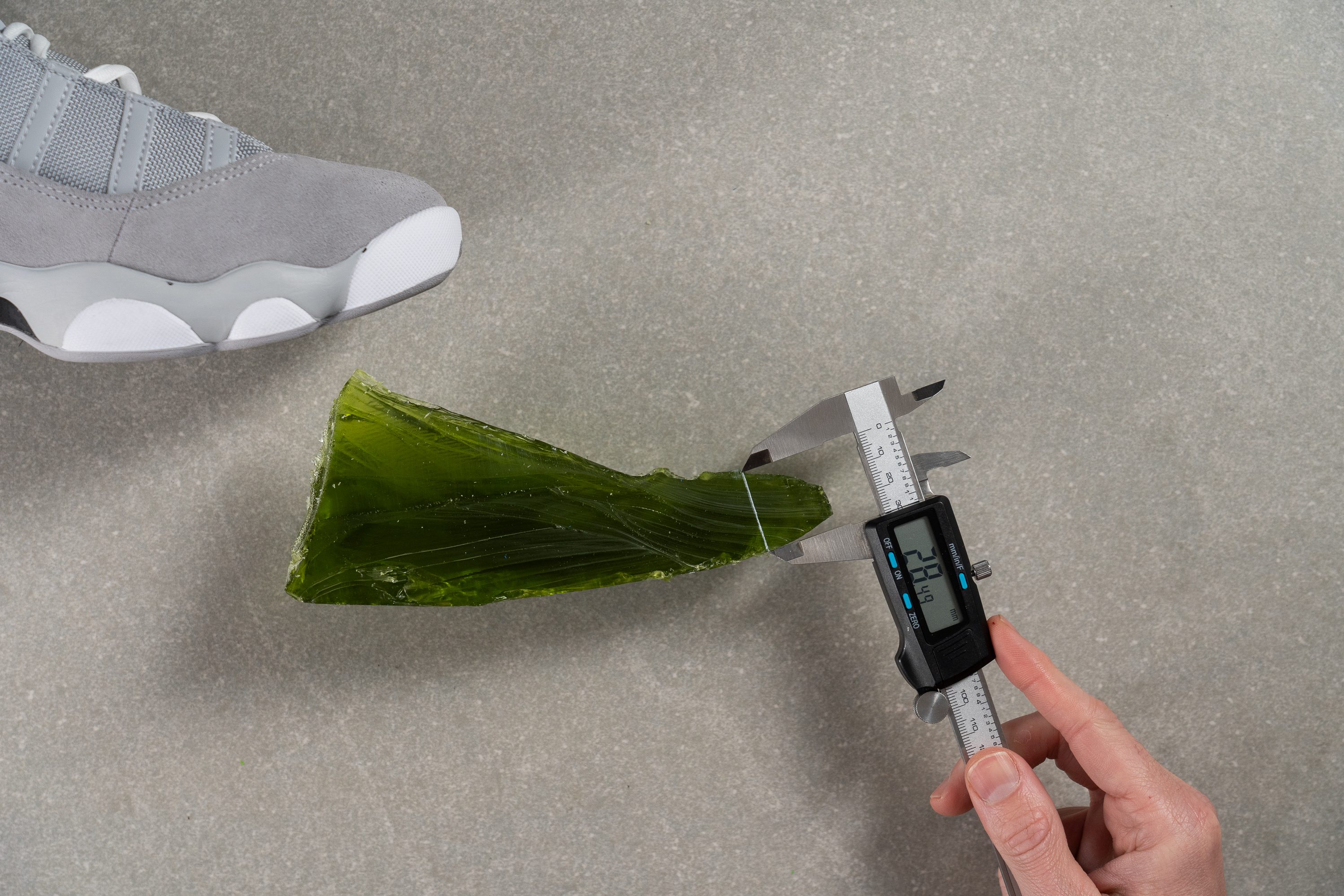
| 6 Rings | 28.5 mm |
| Average | 27.8 mm |
Traction / Grip
The 6 Rings uses herringbone-patterned rubber in the targeted areas to provide traction where it's necessary.

However, we found that it is not the strongest grip for playing basketball.
Traction test
The 6 Rings uses herringbone-patterned rubber in the targeted areas to provide traction where it's most needed.
We tested the shoe's traction in the heel because that's where slip is most likely to occur when walking. Our machine struck the shoe against wet concrete at a 7-degree angle and recorded a friction coefficient of 0.48. It's not the strongest grip for playing basketball but we found it to be very effective for casual urban use on both dry and wet surfaces.
| 6 Rings | 0.48 |
| Average | 0.43 |
Outsole design
The shoe's paw-like outsole is inherited from the Air Jordan 13. Shaped like a panther's paw, it is a nod to Michael Jordan's "Black Cat" nickname. Aside from that, we can see segmented rubber pods which are separated by flex grooves (for better pliability and court feel) as well as a carbon fibre midfoot shank (for added midfoot stability).
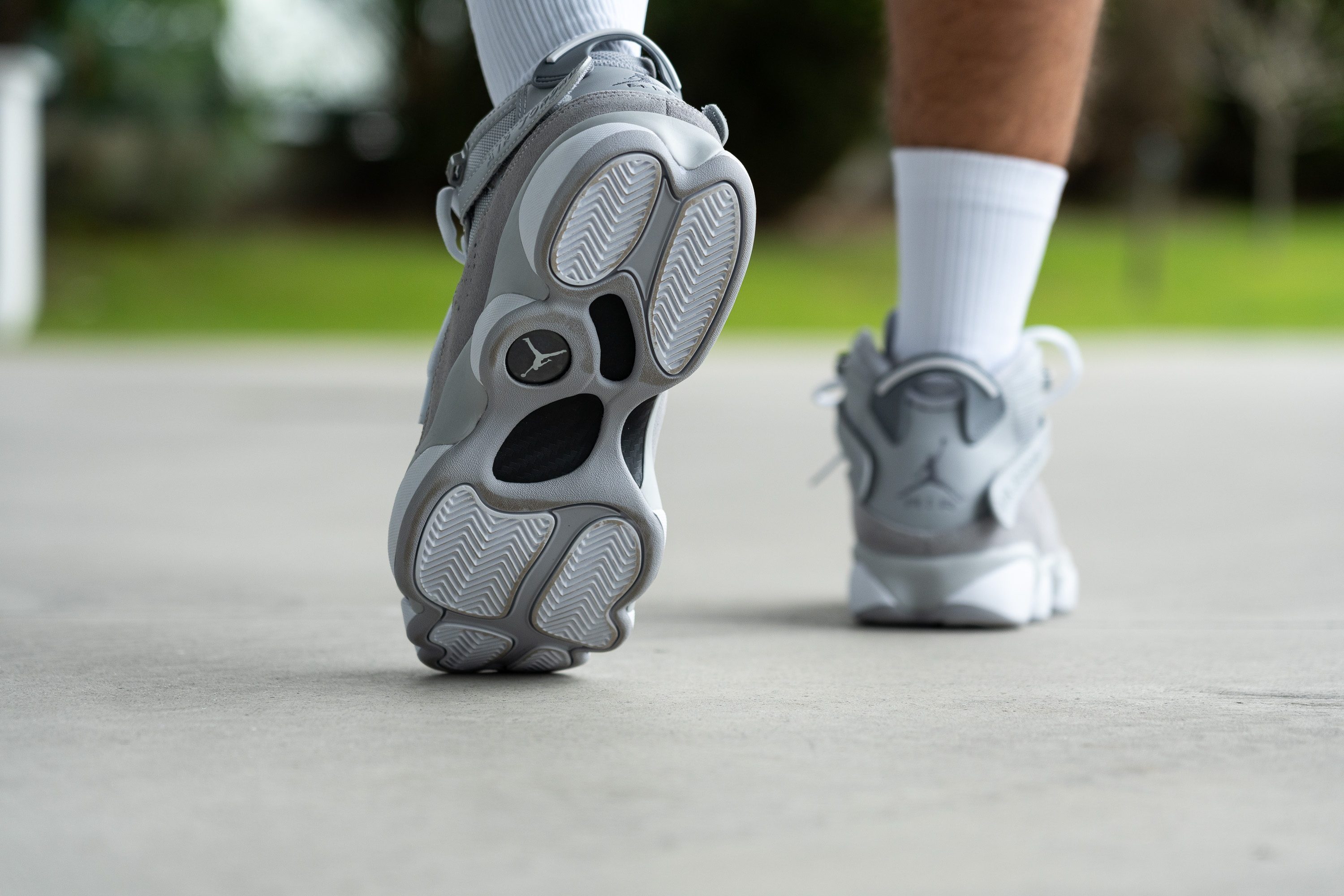
Flexibility / Stiffness
The 6 Rings' incredibly stiff profile is one of the reasons why we think it won't make a perfect daily wear companion.
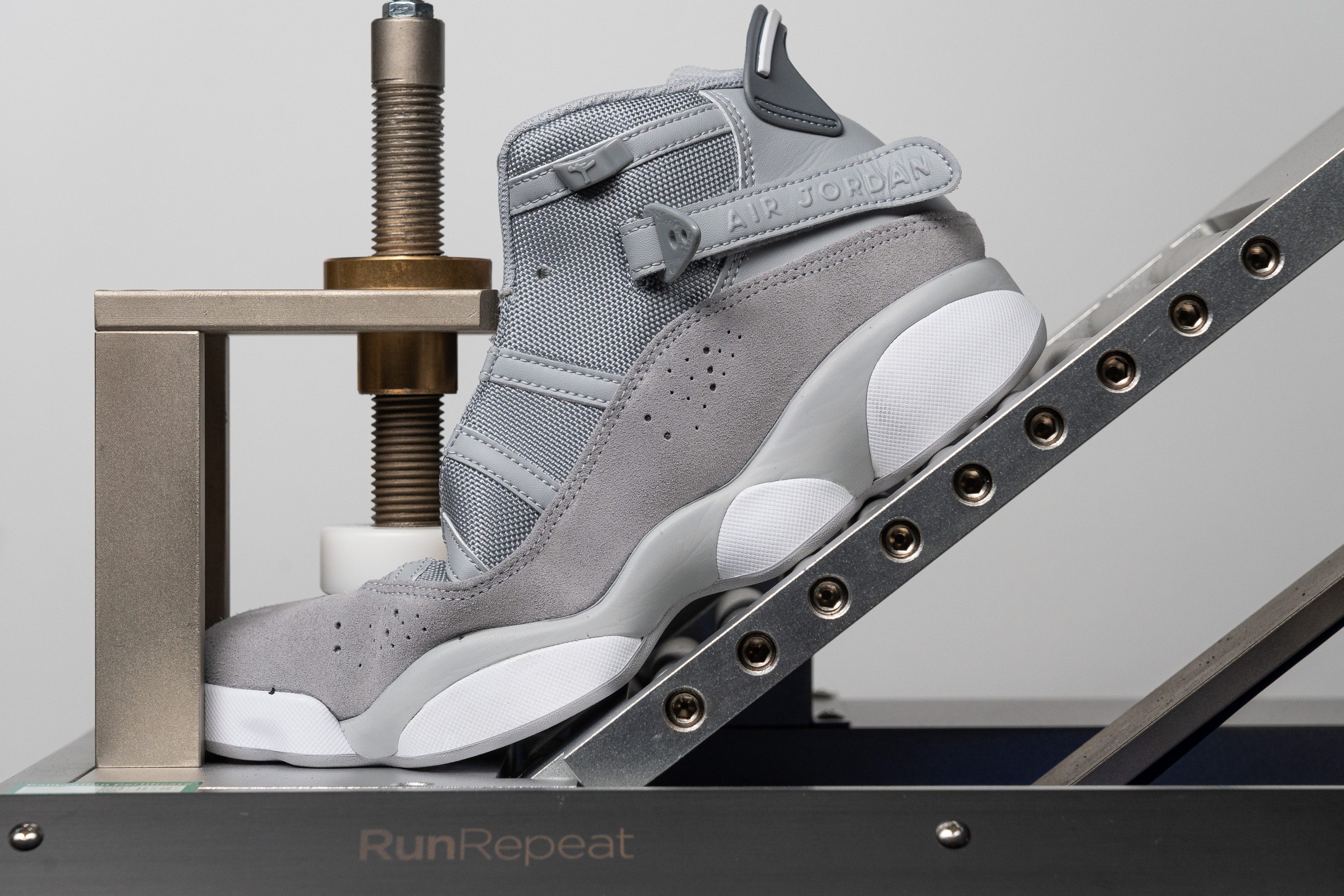
To show you exactly how stiff the shoe is, we used a specialised flexibility machine to measure how many newtons (N) it would take to bend it to a 30-degree angle.
Requiring as much as 27.6N, this Jordan sneaker is one of the least flexible kicks in our lab! It is a whopping 100% stiffer than average!
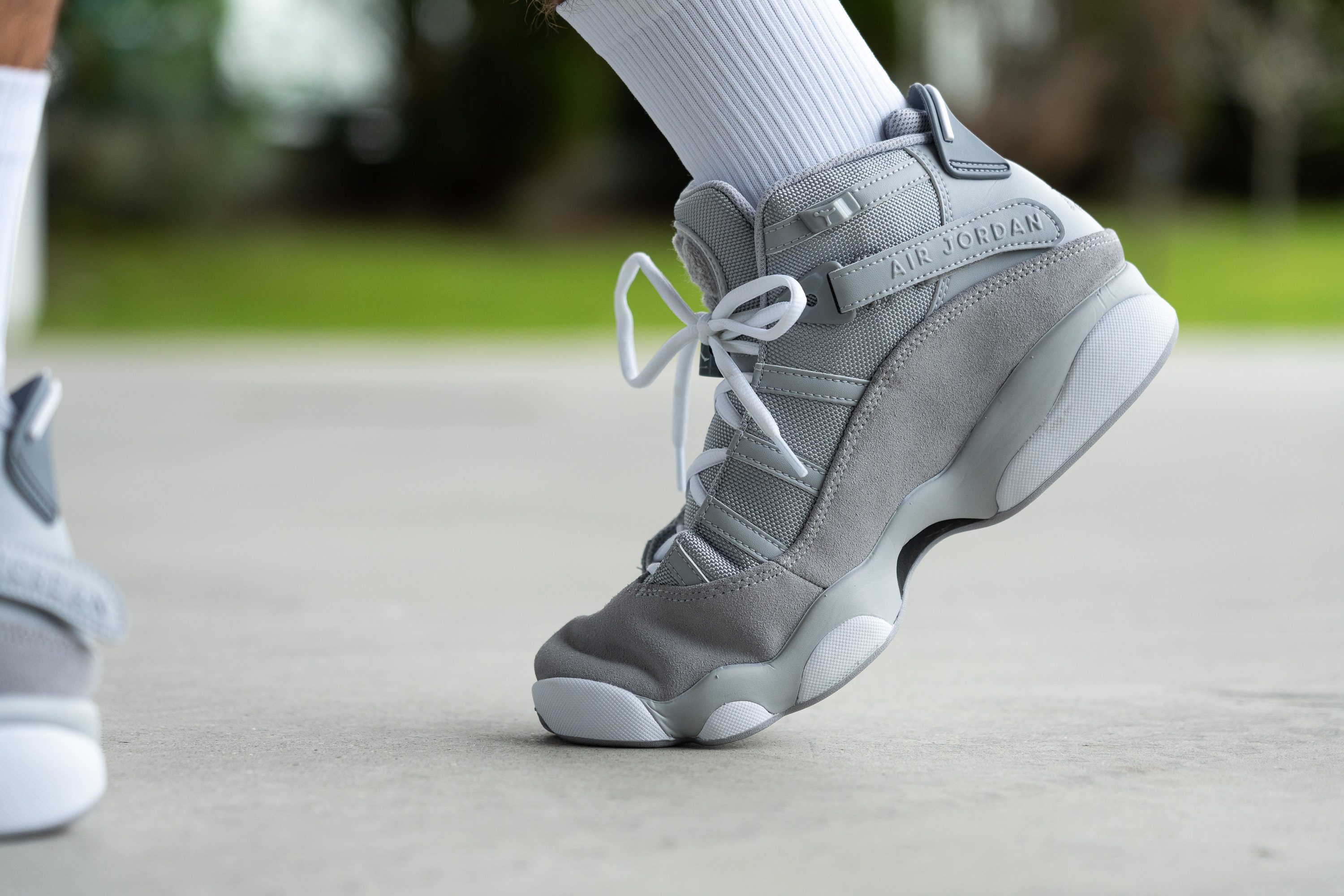
Get ready for a loooong period of breaking the shoe in. And even after a while, it won't get as pliable as most other trainers.
Good thing the shoe has a slight rocker in its sole which helps to make heel-to-toe transitions more bearable.
| 6 Rings | 27.6N |
| Average | 13.3N |
Weight
Weighing the Jordan 6 Rings in a men's US size 9, we got 16.3 oz (462g) on the scale.
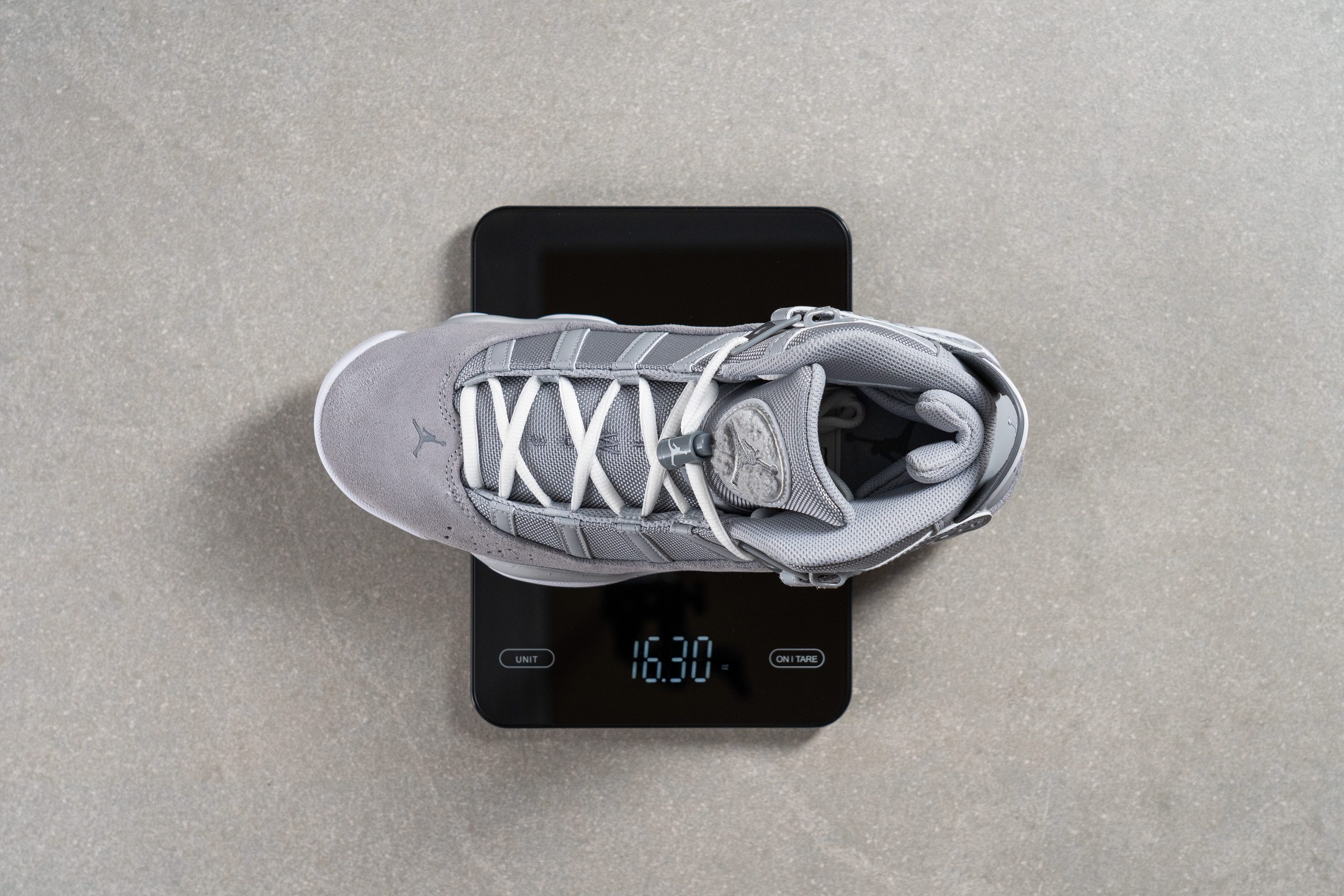
It is a couple of ounces heavier than average but is on par with other mid-top trainers.
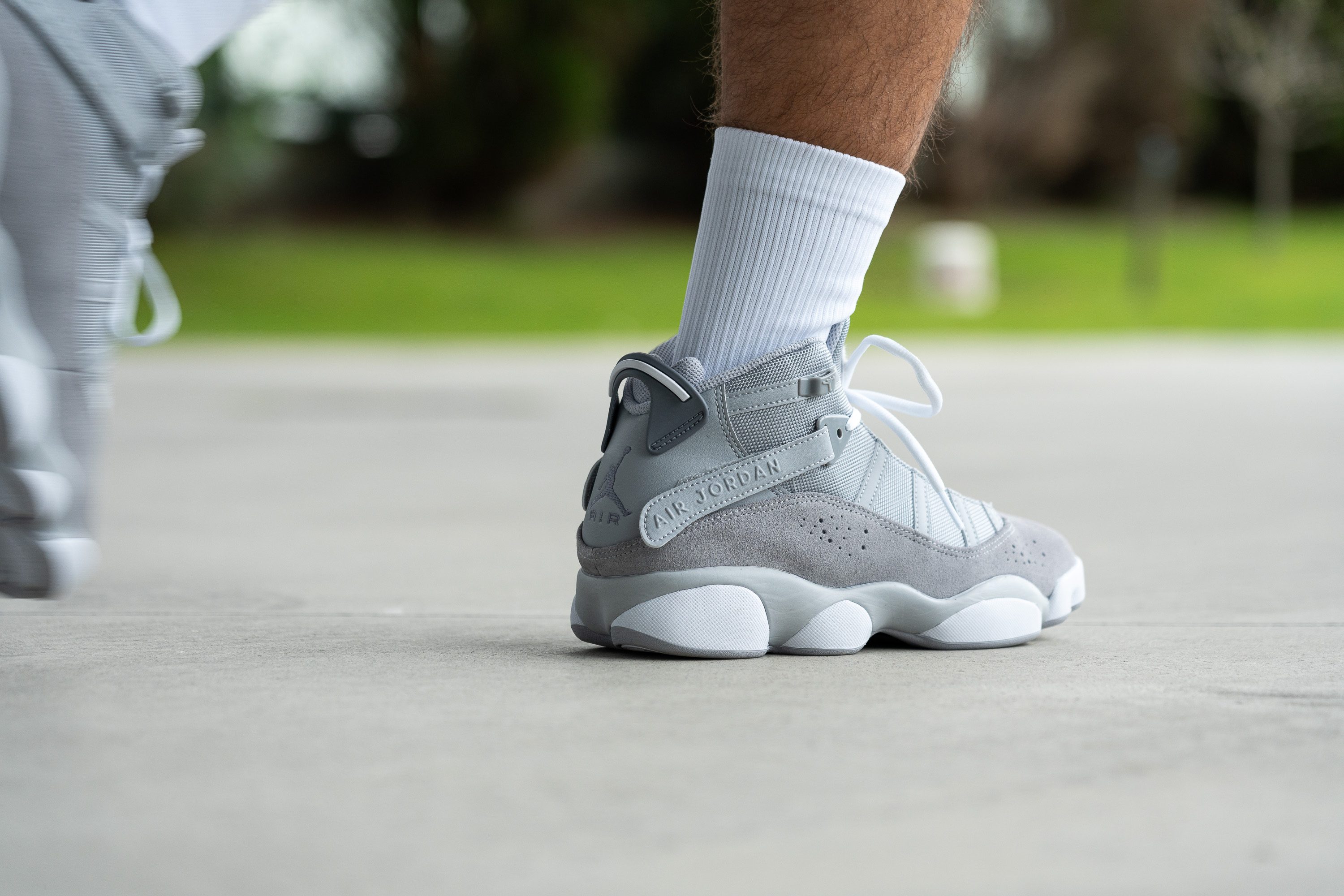
We have no complaints in the weight department because the shoe feels lighter than its static weight suggests.
| 6 Rings | 16.3 oz (462g) |
| Average | 13.8 oz (390g) |
Breathability
We recommend keeping this Jordan sneaker away from summer heat if you don't want to end up with sweaty feet. Despite using a lot of textile in its upper, there is little-to-no ventilation inside the 6 Rings.
Filing the shoe's upper with smoke in our breathability test, we saw that it primarily escaped through the gaps between the tongue and the upper but none of it passed through the toebox or the fabric itself.
Our transparency test further proves our point by showing zero ventilation holes in the shoe's half-cut upper. The perforations on the sides are merely there for decor.
Thus, we couldn't rate this Jordan sneaker any higher than 2 out of 5 on our breathability scale.
P.S. If you do look for a winter-ready kick, check out the Jordan 6 Rings Winterized. It is a modified edition of the 6 Rings that turned it into a durable sneakerboot that can handle the outdoors.
| 6 Rings | 2 |
| Average | 3 |
Stability
Lateral stability test
With a good deal of firmness in its platform and a supportive mid-top collar, the Jordan 6 Rings made us feel steady and planted.
Even though we didn't test its performance as a basketball shoe, we found that it offers enough containment for a short leisurely game.
Torsional rigidity
The exceptionally sturdy build of the 6 Rings made it nearly impossible to twist in our manual test.
On a scale from 1 to 5, the shoe easily earned the highest score for torsional rigidity.
There is very little chance of rolling your feet and ankles in this Jordan sneaker thanks to the support it provides.
| 6 Rings | 5 |
| Average | 3.6 |
Heel counter stiffness
The Jordan 6 Rings also boasts a highly secure heel hold courtesy of its structured heel counter.
It is tall, well-padded, and has an added lip around the ankle bone to keep the rearfoot securely in place.
There is not a lot of give to it either. We rated the heel counter stiffness as 3 out of 5 - not too stiff nor flexible.
| 6 Rings | 3 |
| Average | 3.2 |
Midsole width - forefoot
The Jordan 6 Rings features an unconventional sole shape but it has extended contact points in the areas where it's most needed for stability.
For example, it has an outrigger on the outer side of the forefoot, like most basketball shoes.
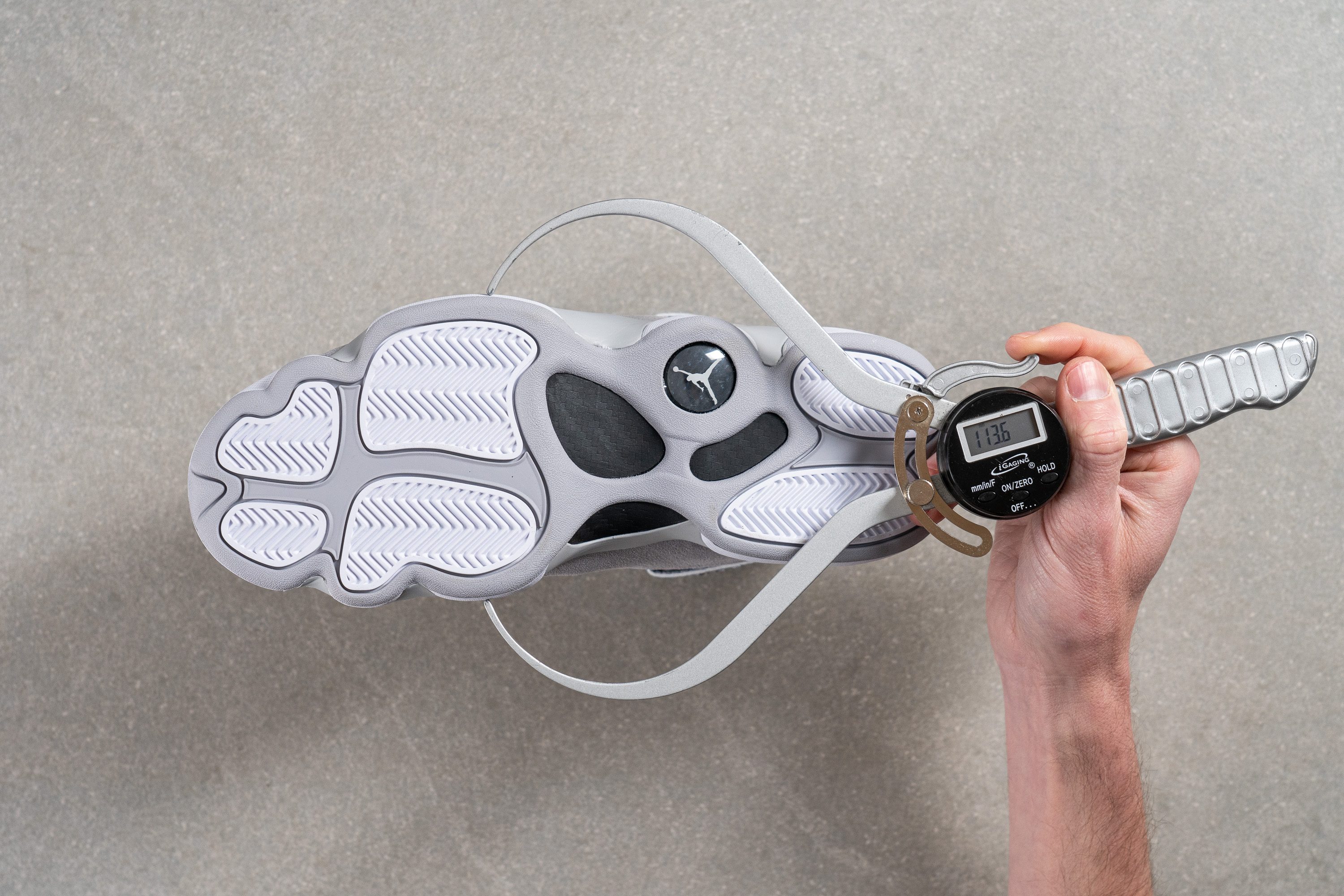
Measuring it in the widest area, our calliper showed 113.6 mm which is about 5 mm wider than average.
| 6 Rings | 113.6 mm |
| Average | 108.9 mm |
Midsole width - heel
The sneaker also has protrusions in the heel that reach 90.8 mm in the widest part. Again, 7.5 mm wider than average!
The shoe indeed has a lot of hoop shoe features.
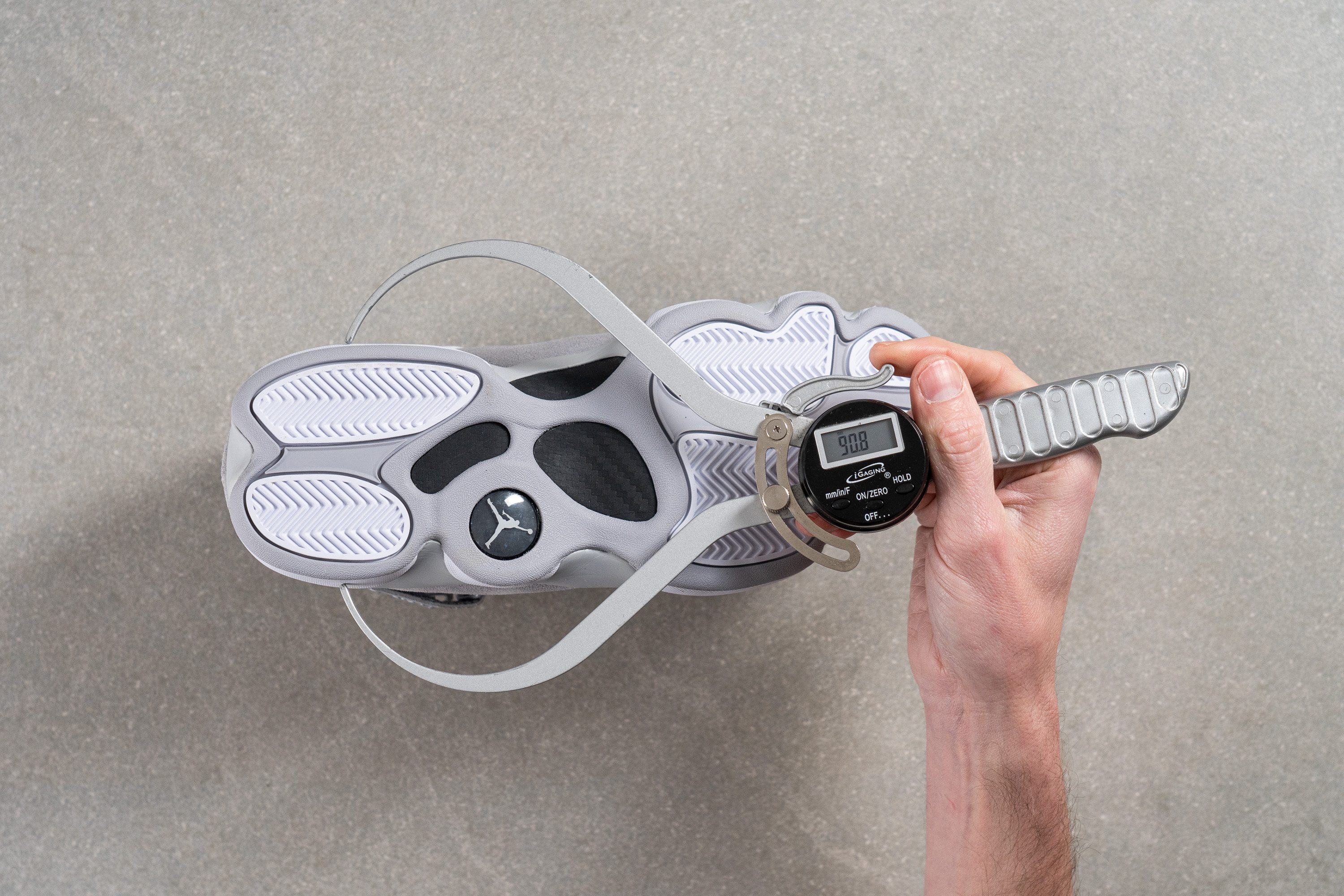
| 6 Rings | 90.8 mm |
| Average | 84.0 mm |
Durability
Leather/Suede quality
Our pair of the Jordan 6 Rings features three materials in the upper: textile, synthetic leather, and real suede.
Other colorways of the shoe have glossy patent leather instead of suede.
Using a butane torch and a leather scratch awl, we confirmed that the suede was indeed real. It didn't catch fire or melt, unlike the synthetic panel at the back of the shoe.
| 6 Rings | Real suede |
Toebox durability
Placing a large suede overlay over the shoe's toebox was a smart choice. The natural durability of this high-quality material prevents the forefoot from tearing apart too soon.
We exposed the shoe's toebox to the most abrasive test in our arsenal - drilling it with sandpaper for 12 seconds at a 5K RPM speed.
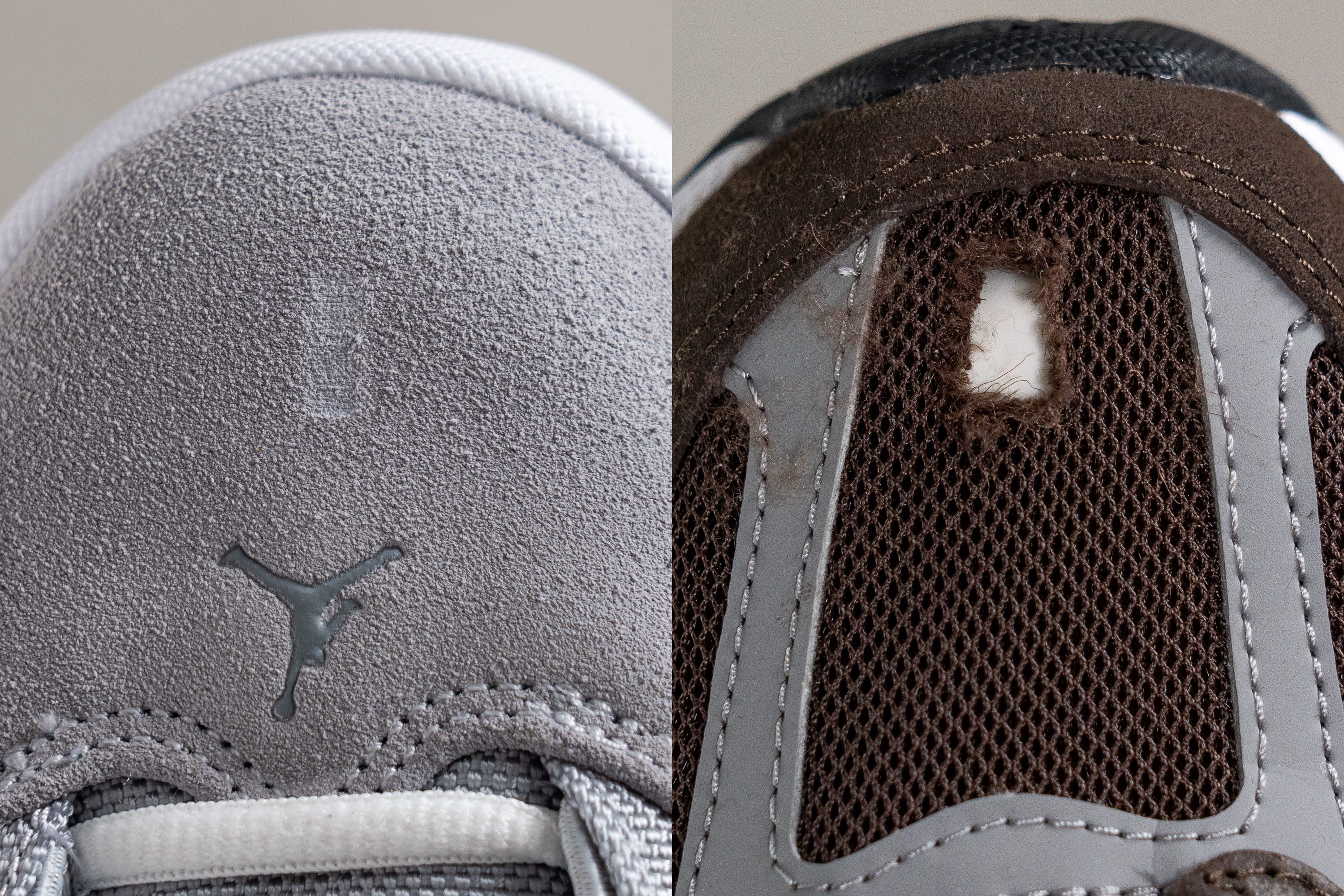
But the suede barely showed any signs of wear! Remaining in near-perfect condition, it earned the shoe the highest durability score of 5 out of 5.
| 6 Rings | 5 |
| Average | 3.7 |
Heel padding durability
Even the more delicate parts like the inner lining stood up to the test with flying colours.
A 4-second encounter with the Dremel left the textile practically unscathed.
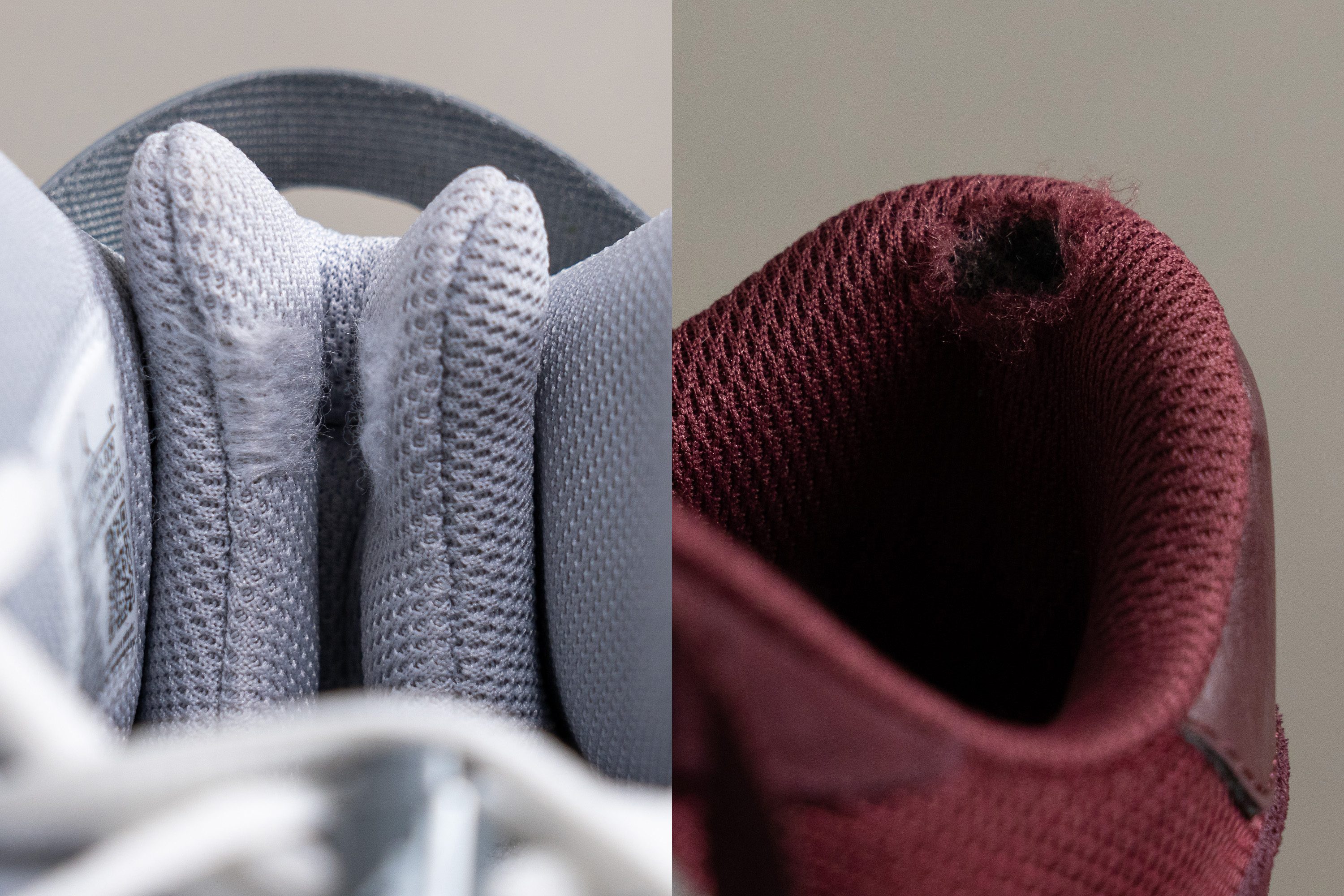
This is quite impressive as the fabric looks nearly identical to the mesh lining of the shoe on the right. But the difference in wear resistance is striking.
Once again, the Jordan 6 Rings received a high durability score - 4 out of 5 for heel lining durability.
| 6 Rings | 4 |
| Average | 3.2 |
Outsole hardness
Touted as a hybrid sneaker that can handle an occasional game of basketball, the 6 Rings features a pretty sturdy outsole.
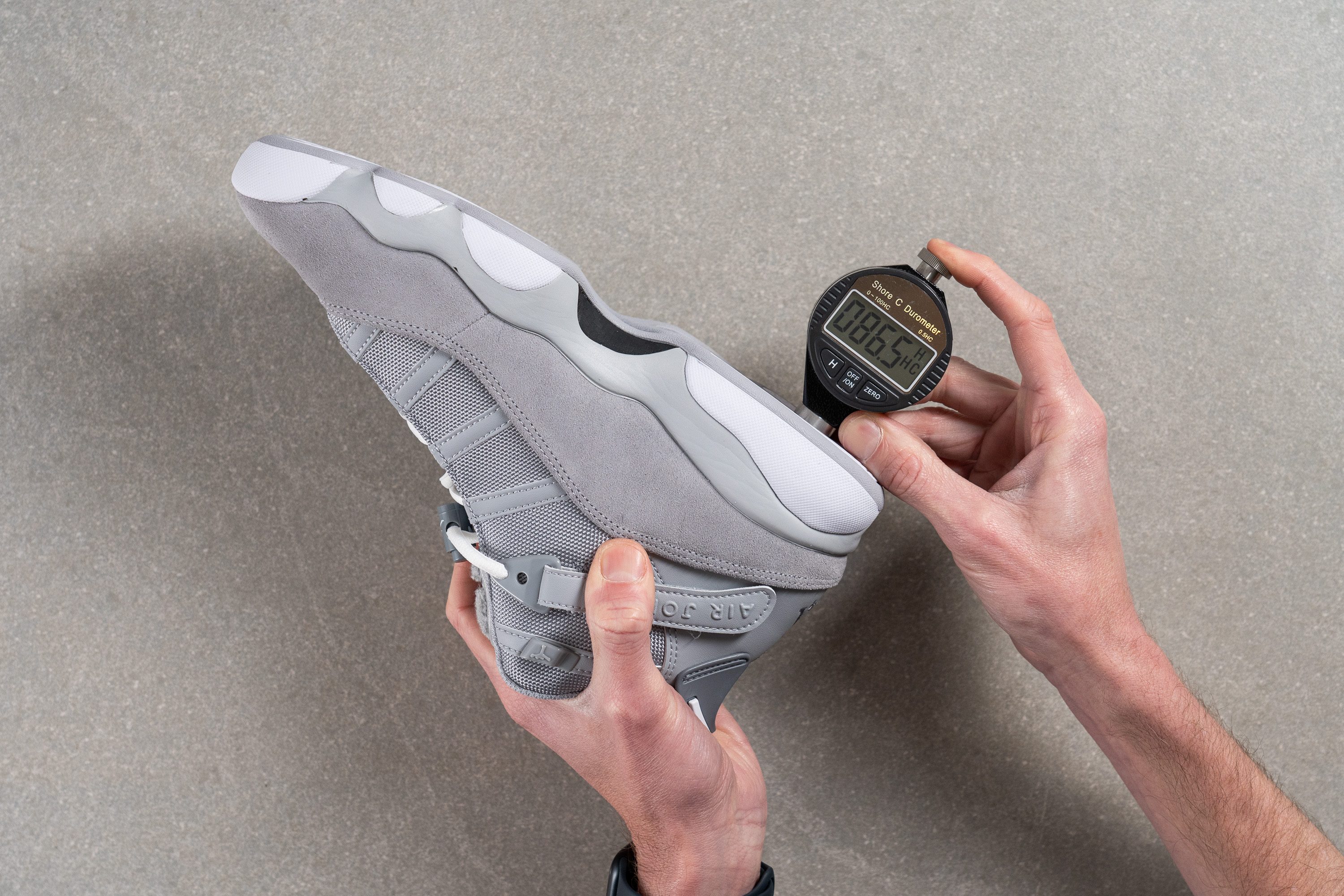
A high reading of 86.4 HC on our Shore C durometer proved that the rubber is indeed on the hard side. That is usually a good indication of longevity.
| 6 Rings | 86.4 HC |
| Average | 85.7 HC |
Outsole durability
Fortunately, the shoe's outsole durability equaled our high hopes.
A round of a very demanding Dremel test at a 10K RPM speed confirmed that the shoe's rubber does not shy away from challenges.
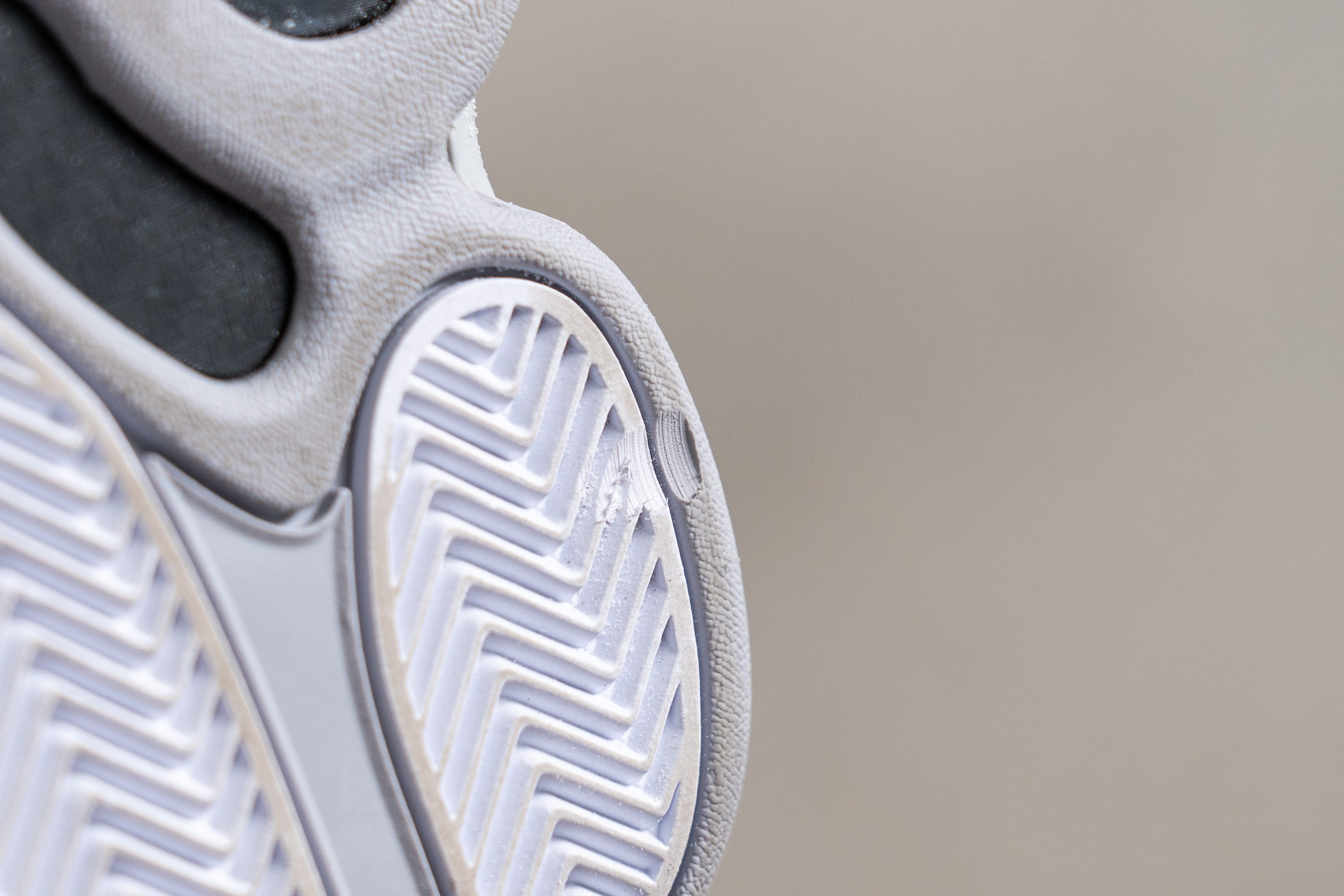
The dent was a mere 1.0 mm deep which is no different from the average sneaker outsole.
| 6 Rings | 1.0 mm |
| Average | 1.1 mm |
Outsole thickness
This Jordan sneaker also uses a reasonably thick layer of rubber at the bottom. Our calliper showed 3.5 mm which is not the thickest but still sufficient.
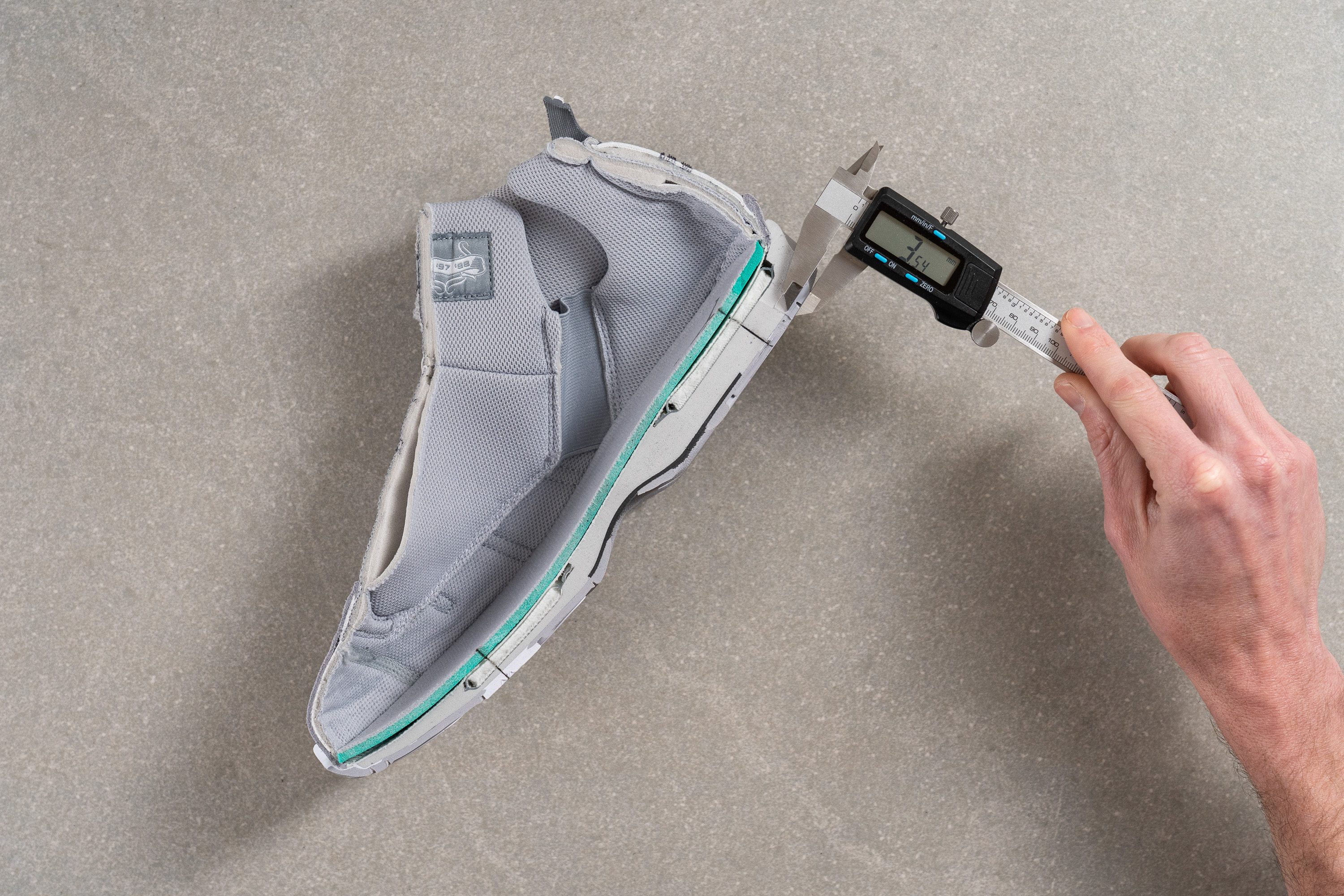
Considering how much wear resistance there is to the Jordan 6 Rings, we feel confident recommending it for day-to-day wear and even some hooping.
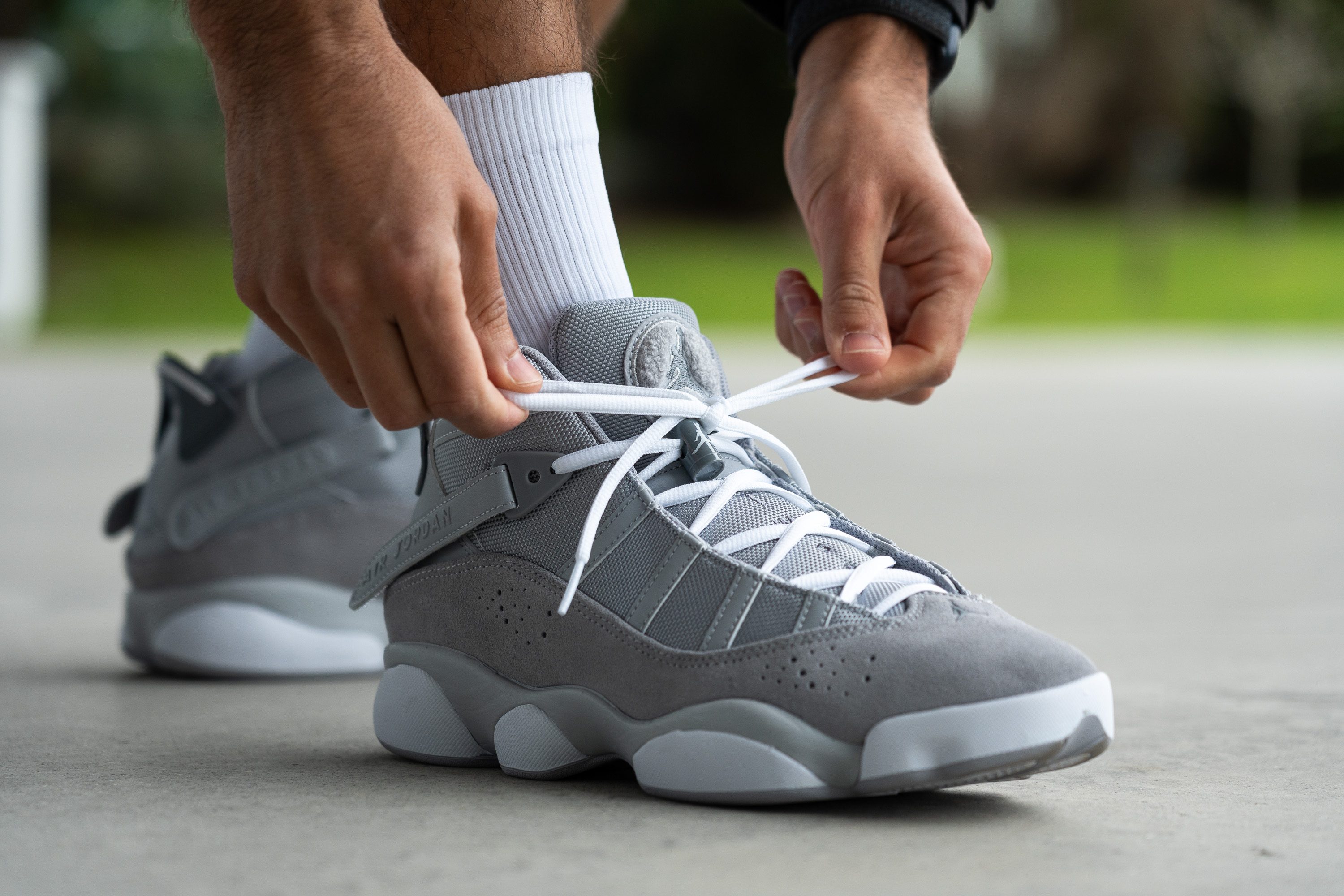
It is not the type of sneaker that should only be kept on a display shelf and never see the light of day to keep its integrity.
| 6 Rings | 3.5 mm |
| Average | 5.3 mm |
Misc
Insole thickness
Completing the shoe's cushioning setup is a pretty standard insole. Our calliper shows that it is 4.1 mm thick in the heel which is slightly thinner than average.
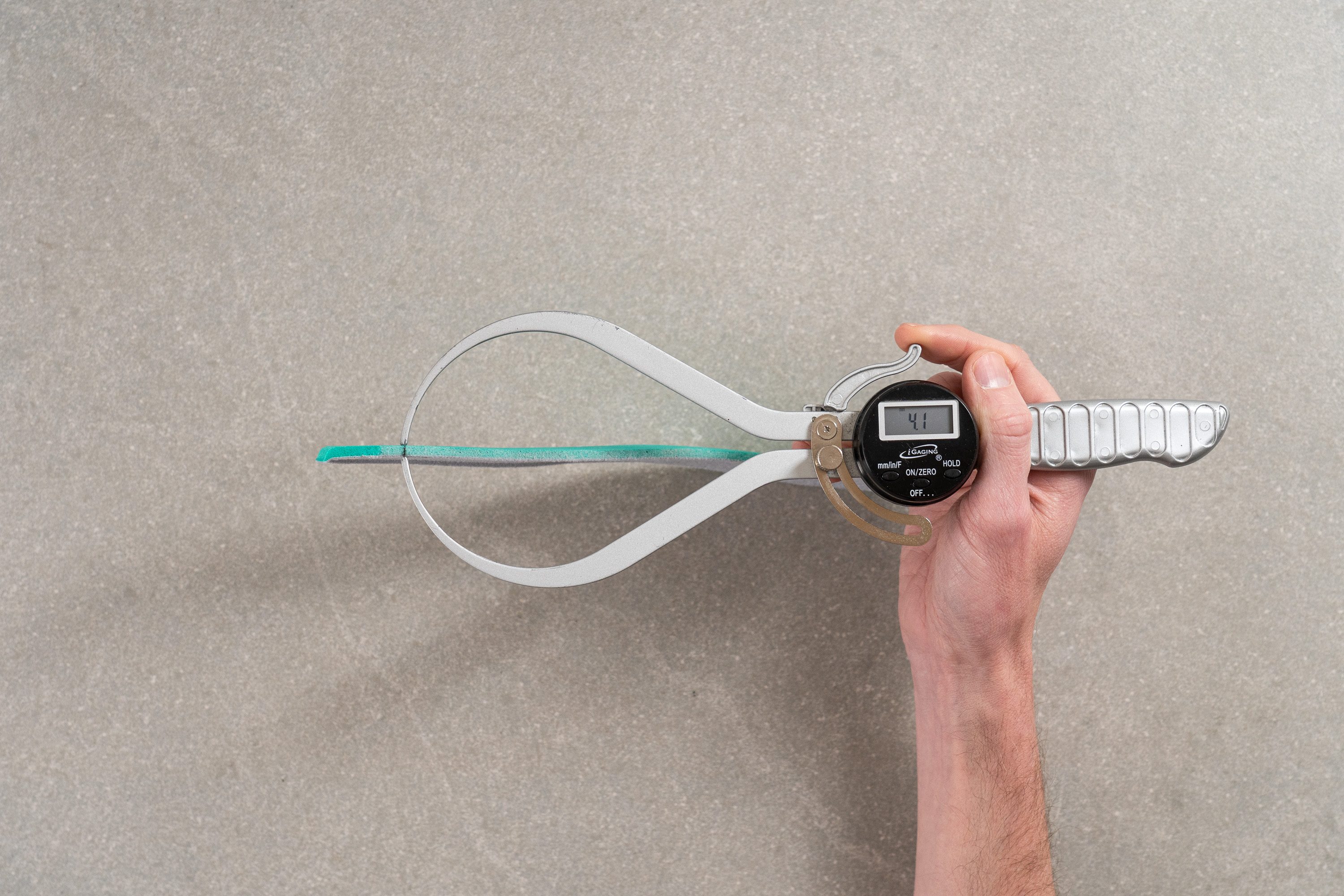
| 6 Rings | 4.1 mm |
| Average | 5.1 mm |
Removable insole
Not everybody is a fan of contoured insoles like the one we found in the 6 Rings.
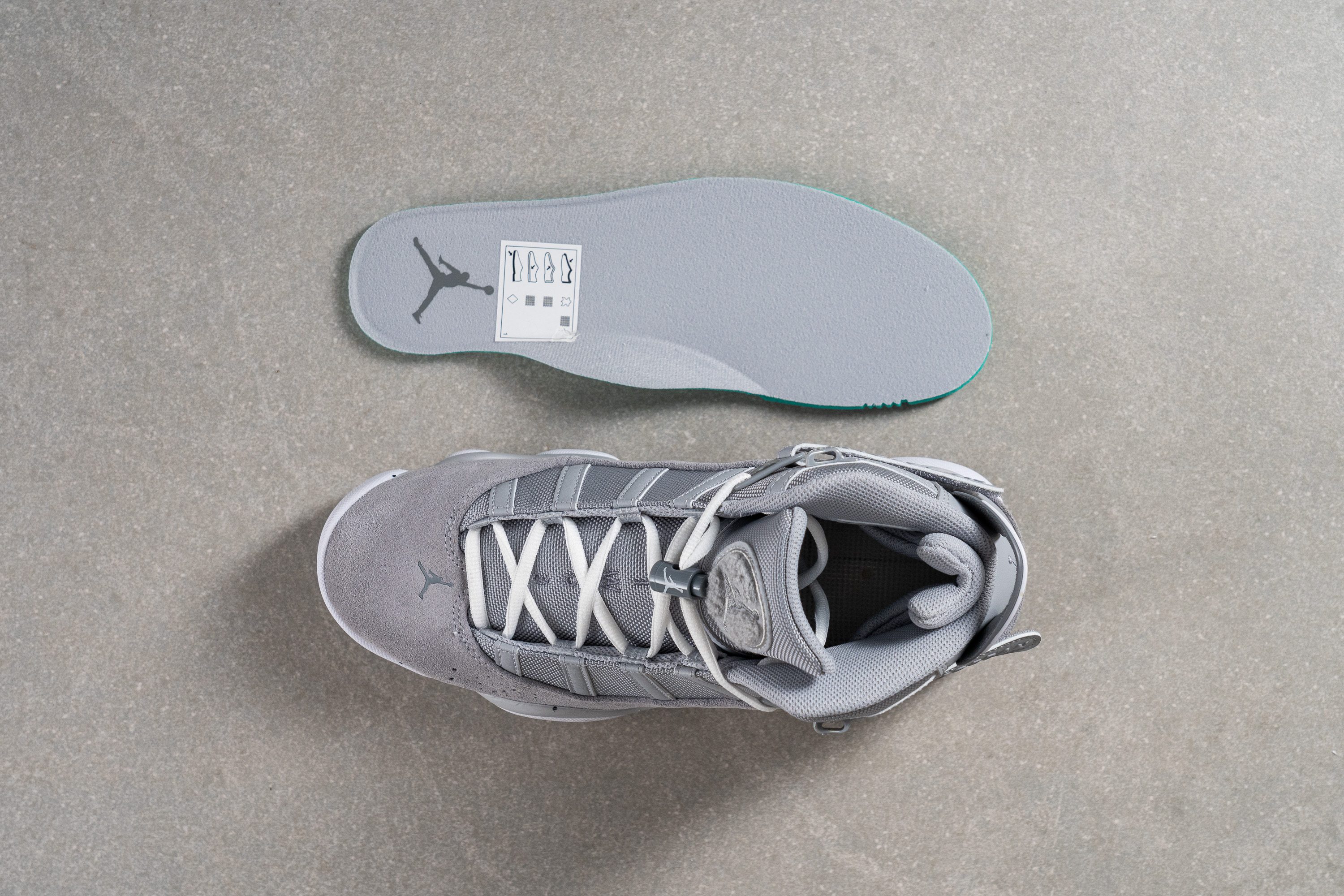
If you want to customise the underfoot experience, you can effortlessly remove the shoe's stock insole.
| 6 Rings | Yes |
Reflective elements
This Jordan sneaker does not have any reflective elements.
But if that's an important feature to you, have a look at our catalogue of reflective trainers.
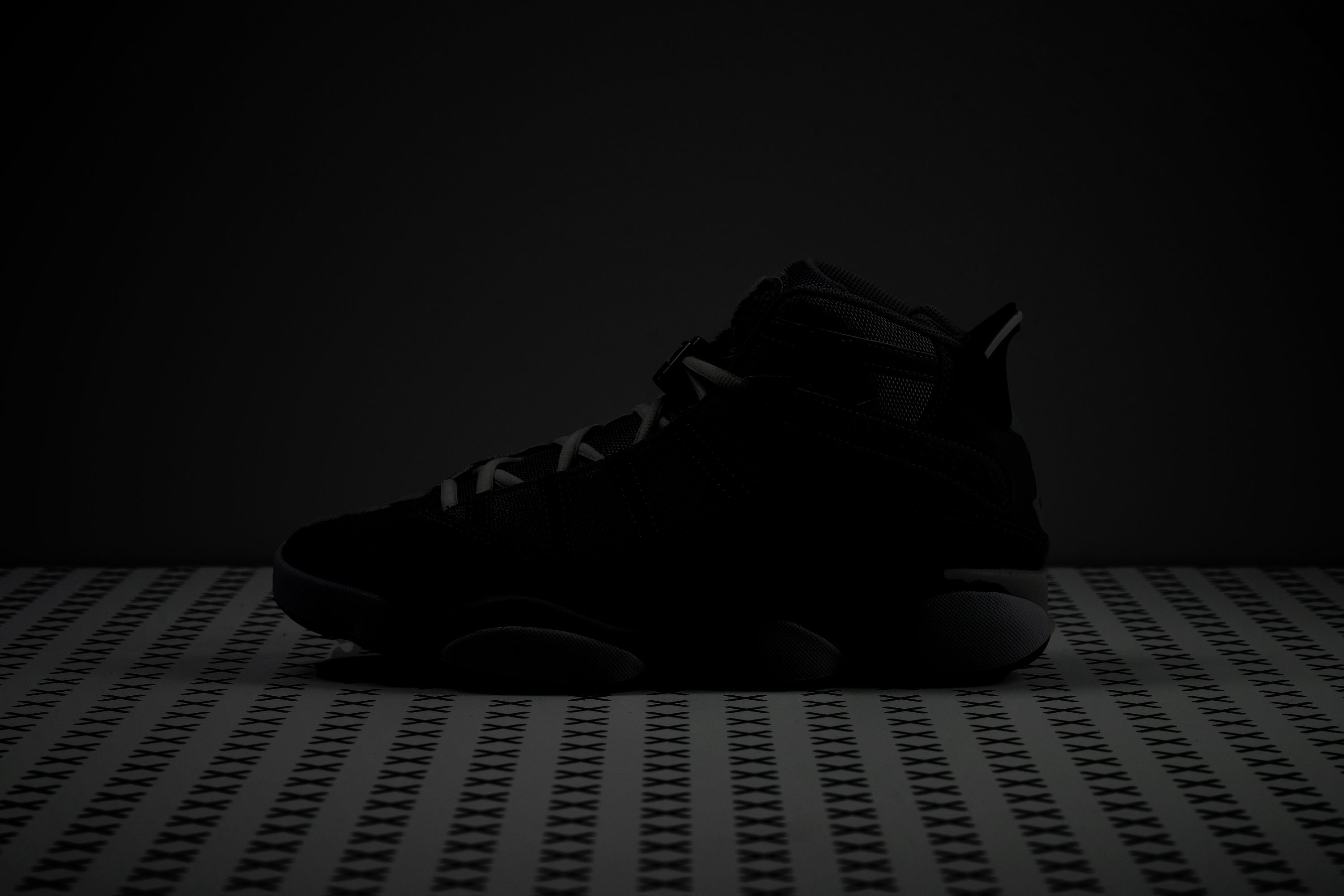
| 6 Rings | No |
Tongue padding
The tongue itself has a nice amount of padding to provide instep comfort and protect it from lace pressure.
It showed 9.1 mm of thickness on our calliper which is standard for a lifestyle sneaker.
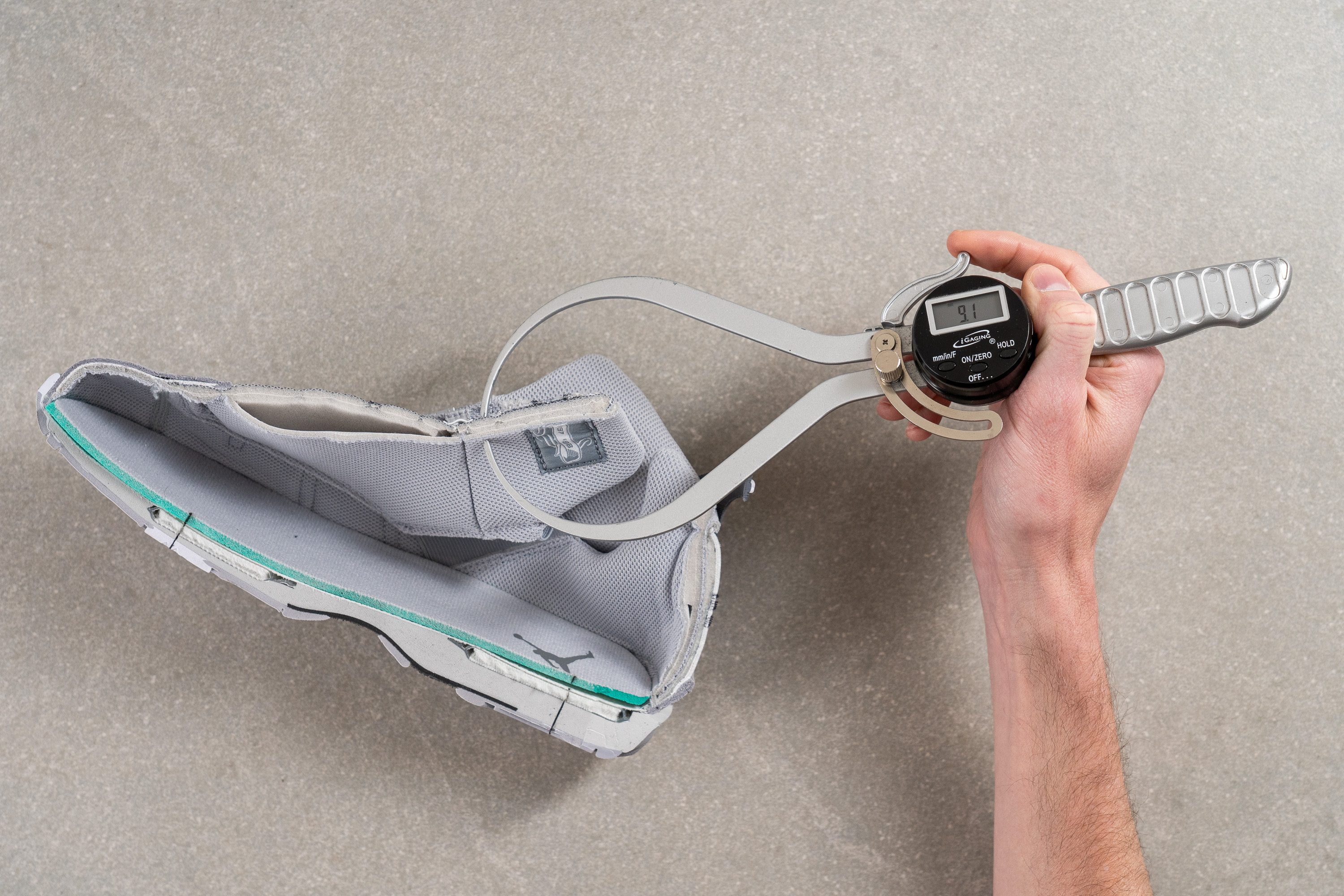
| 6 Rings | 9.1 mm |
| Average | 9.6 mm |
Tongue: gusset type
The tongue of the Jordan 6 Rings is so large that it only makes sense to have it attached to the upper on both sides to prevent slippage.
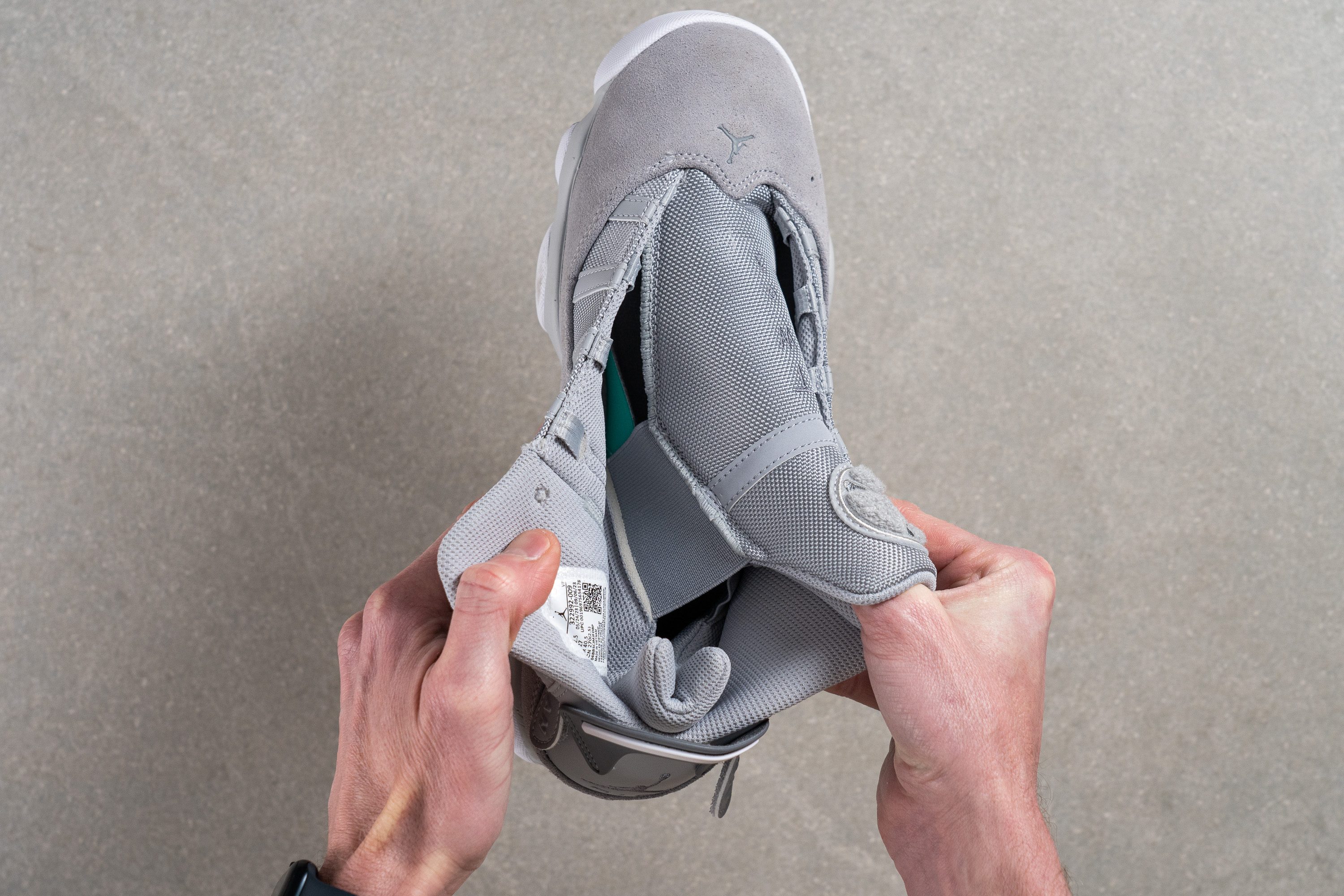
The elastic straps help to create a very secure lockdown and keep the tongue in place.
| 6 Rings | Both sides (semi) |
Heel tab
The Jordan 6 Rings has a very prominent heel loop. We found it super handy for a quick on-and-off action.
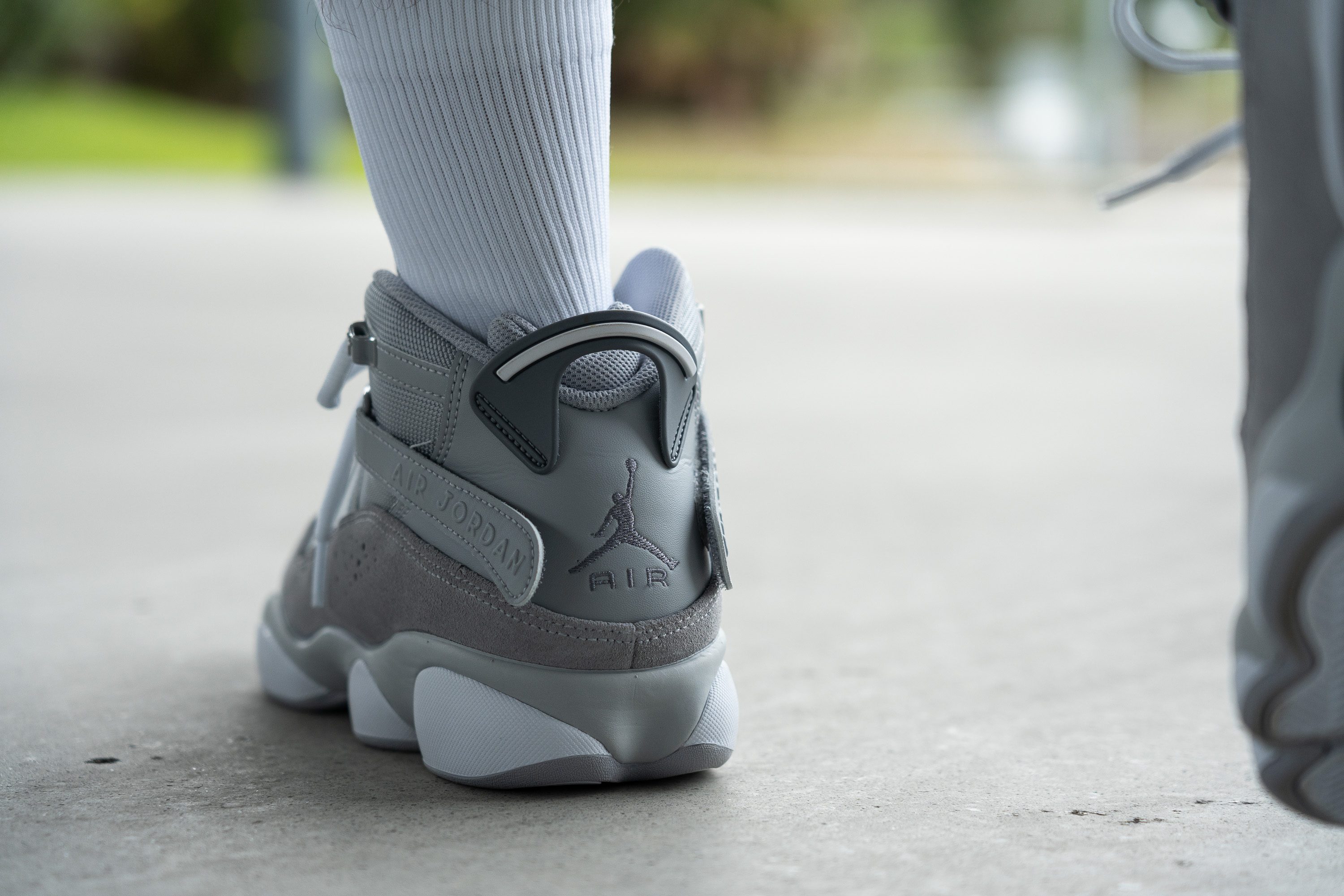
| 6 Rings | Finger loop |
The origins of the Jordan 6 Rings
The Jordan 6 Rings was first released in 2008, 20 years after Michael Jordan's retirement as a Chicago Bulls player. "6 Rings" refers to the athlete's championship triumphs in 1991-1993 and 1996-1998.
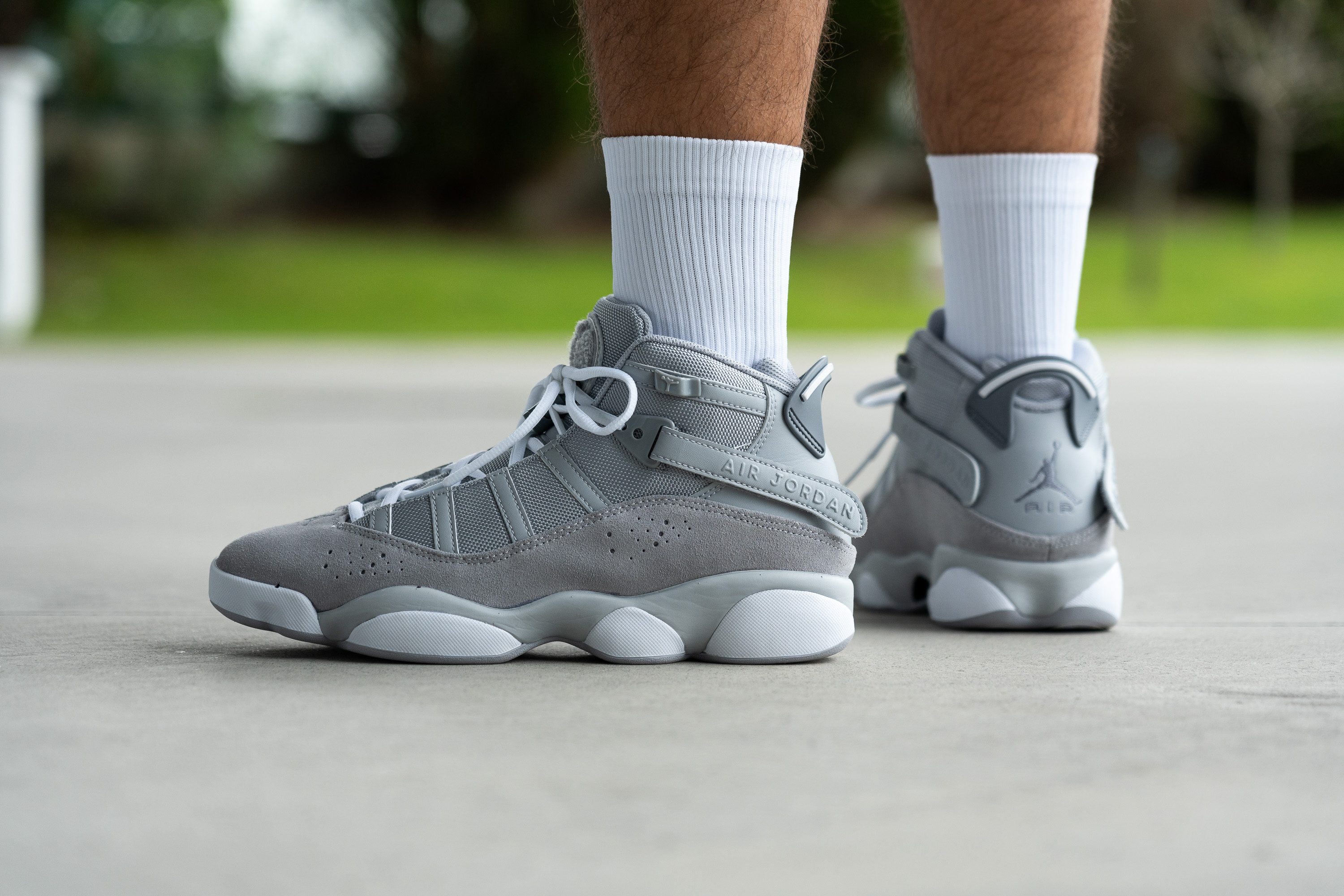
It is a hybrid sneaker that borrows details from all seven shoes His Airness wore at the peak of his career.
Air Jordan enthusiasts will detect them all in the blink of an eye but here is a cheat sheet for the rest of us:
- Air Jordan 6: the large heel tab and the lace toggle
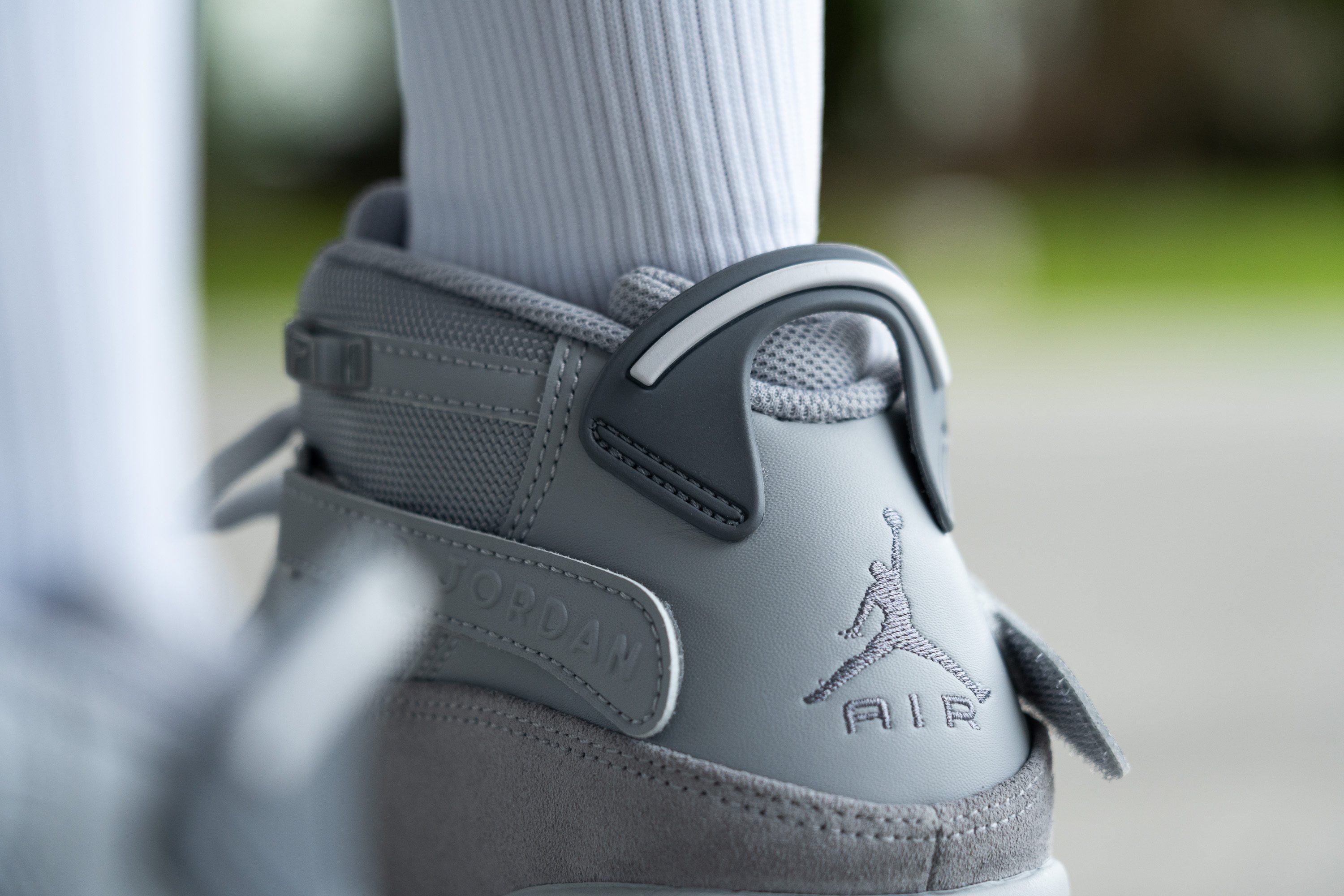
- Air Jordan 7: the perforations on the rand
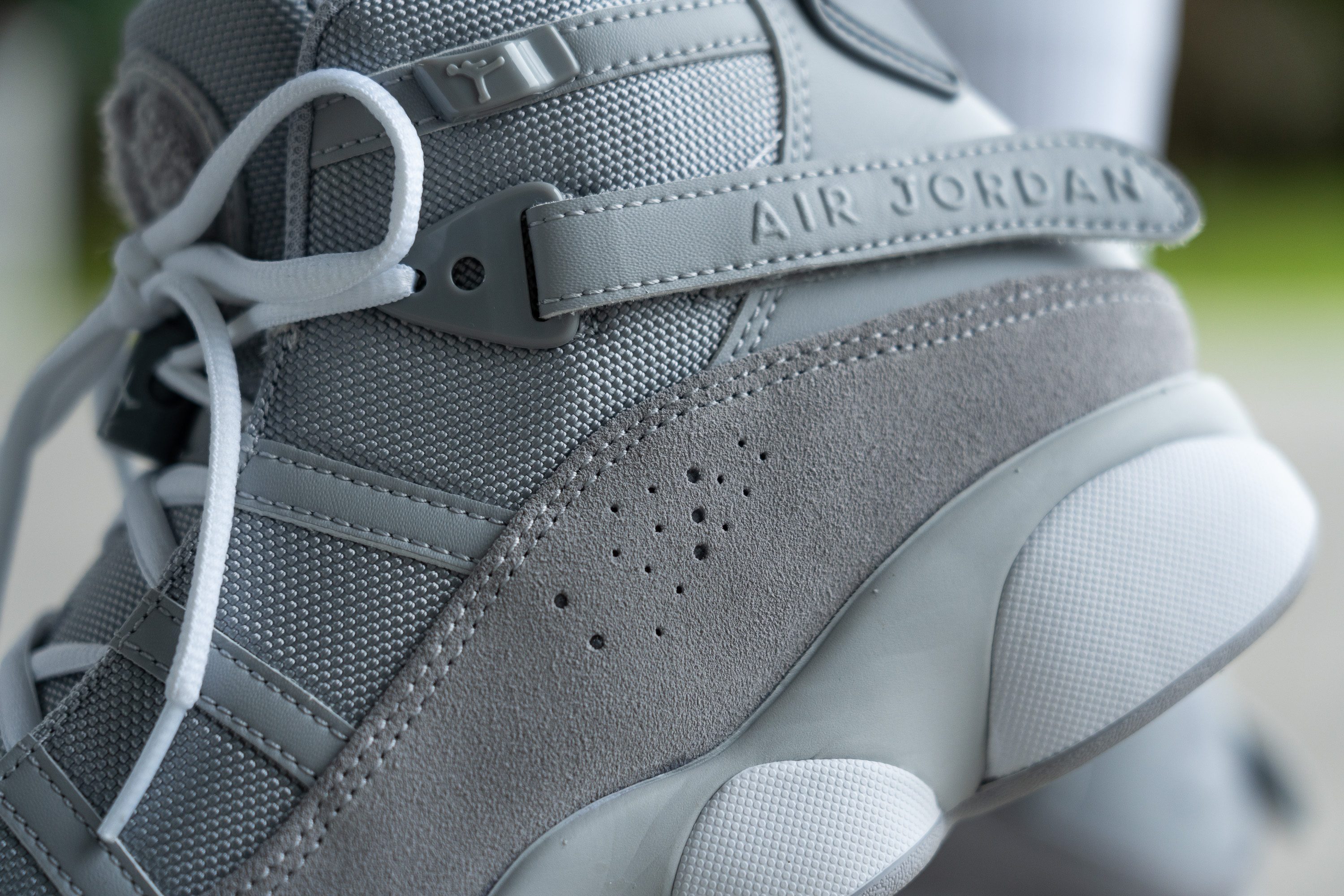
- Air Jordan 8: the Velcro strap and the fuzzy tongue patch
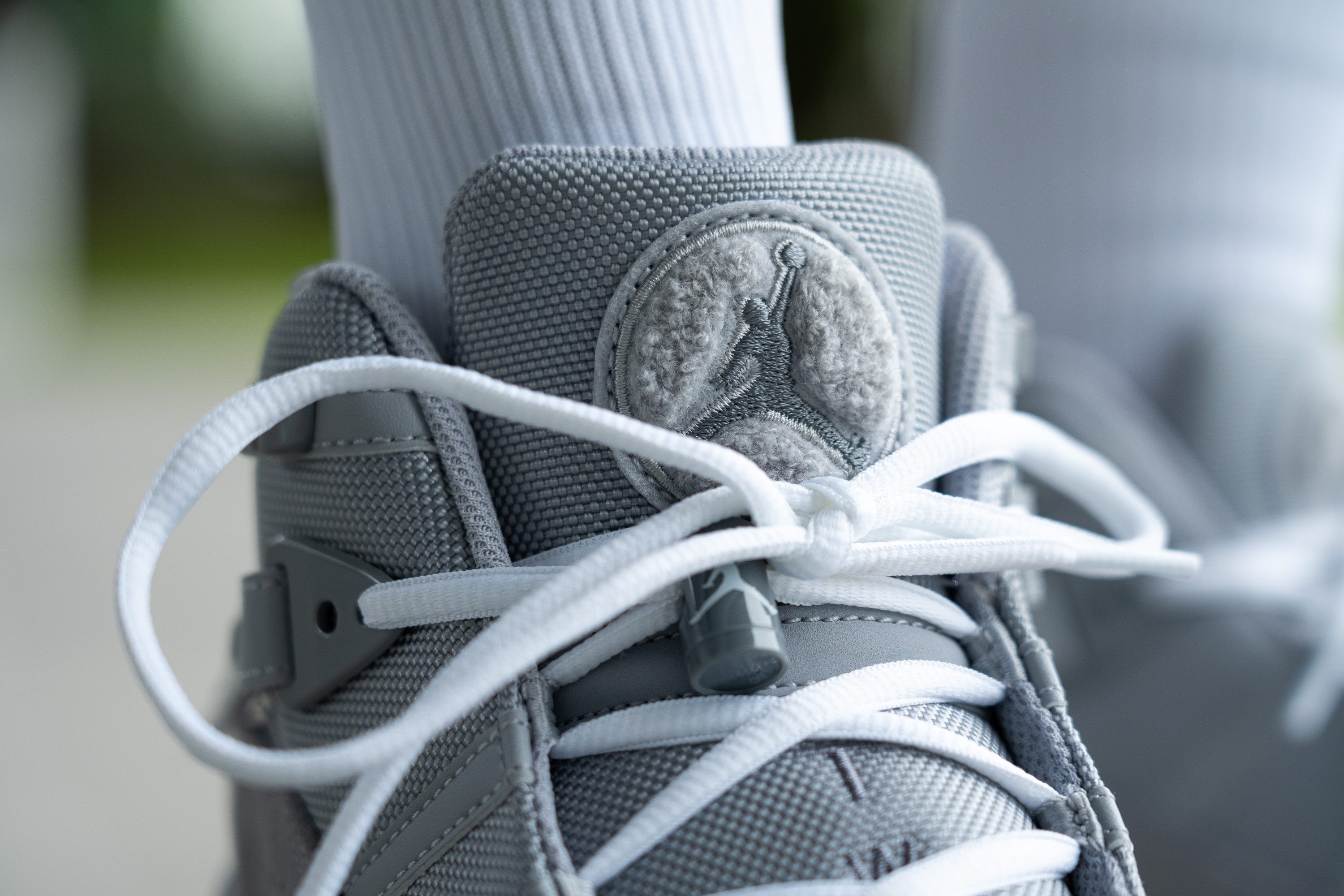
- Air Jordan 11: the large leather (or suede) overlay
- Air Jordan 12: the plastic eyelet and the "TWO3 logo" stitching on the tongue
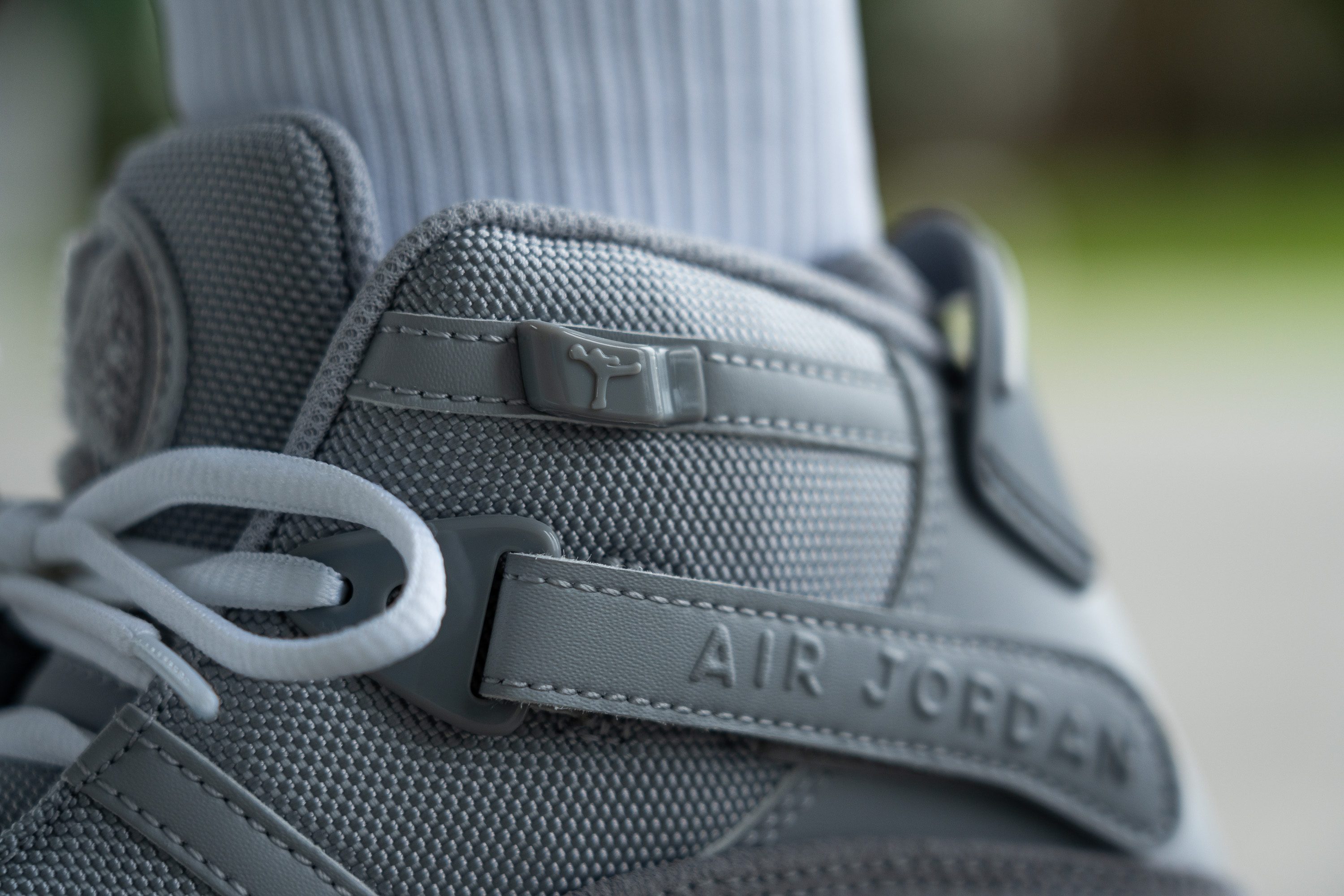
- Air Jordan 13: the outsole tooling and Zoom Air units
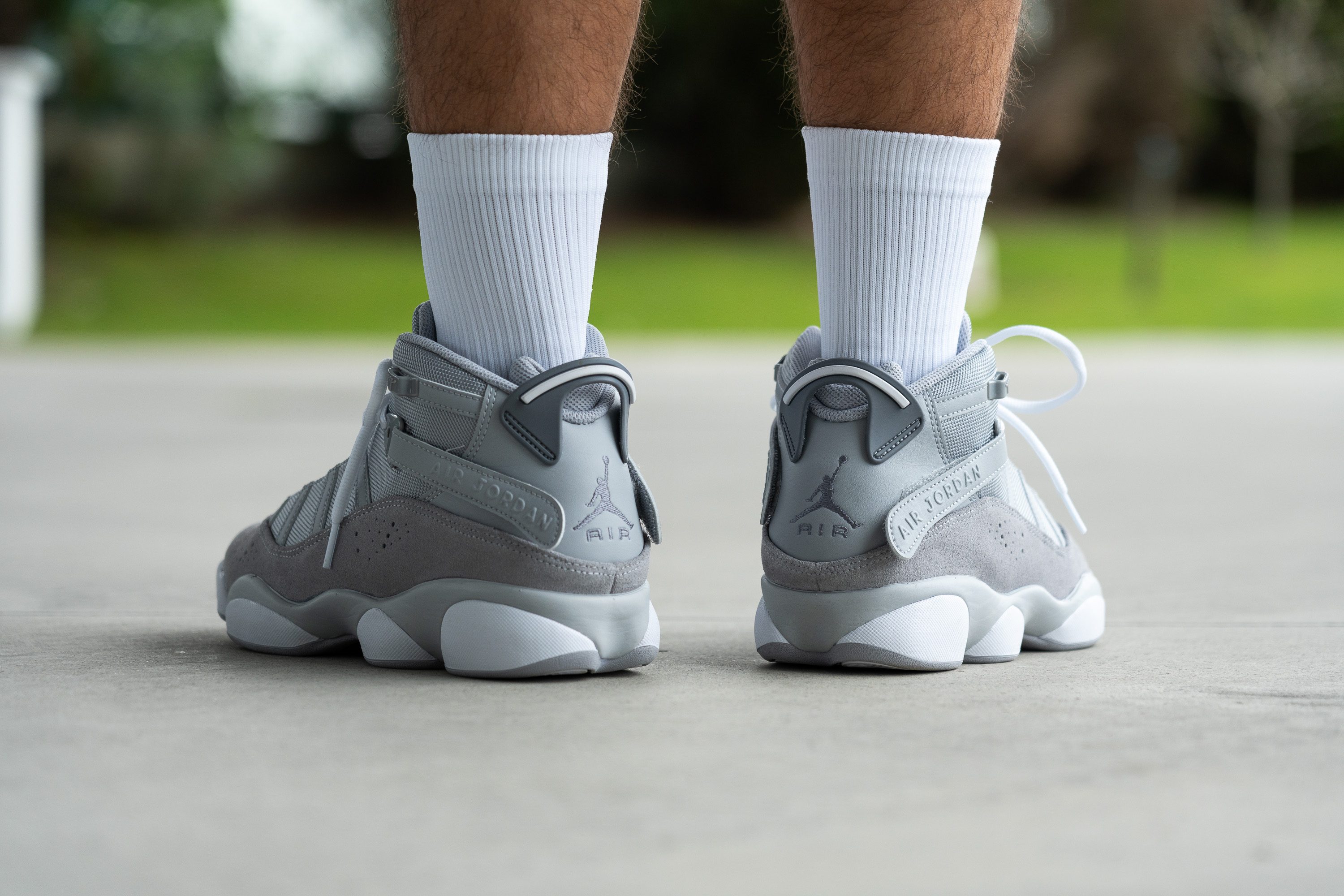
- Air Jordan 14: the toebox design with the "Jumpman" logo
